Non-Postage Baseball Stamps
Cinderella stamps, a specialized segment within philately, often imitate traditional postage stamps, yet are non-postal. These collectibles, covering themes from sports to holidays and brand advertising, serve primarily promotional purposes. This page showcases a variety of baseball-themed Cinderella stamps, each reflecting the sport’s cultural and societal impact. From global events to local initiatives, they illustrate different aspects of baseball’s influence.
The stamps shown below specifically omit those from brands like MLBA, Fleer, Post/Jello, Sporting News, and Topps, known for at times printing essentially “baseball cards using stamps as a medium.” This focus ensures a dedication to a genuine representations of Cinderella stamps that narrate baseball’s rich history and global influence.
Barcelona Olympics in 1992
Dominica
The country of Dominica issued several stamps to honor the 1992 Olympics in Barcelona, but this wasn’t one of them. This proof was never completed and put into circulation. This souvenir stamp is imperforate and shows the $5 denomination intended in preparation for becoming a postage stamp.
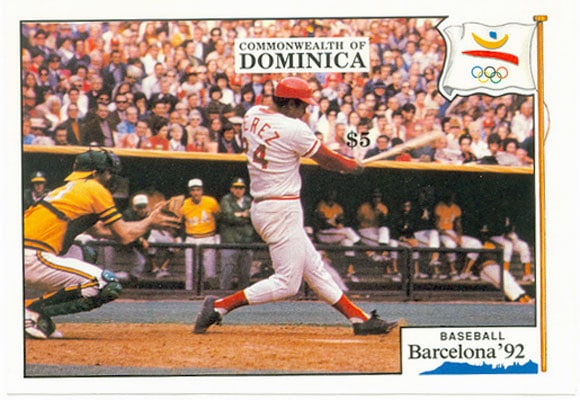
Spain
This 1992 Barcelona Olympic promotional stamp sheet from Spain features Cobi, the official mascot of the Games, designed as a Catalan Sheepdog in a Cubist style. These stamps are part of a 20 souvenir sheet set, each depicting Cobi engaged in various sports represented at the Barcelona ’92 Olympic Games.
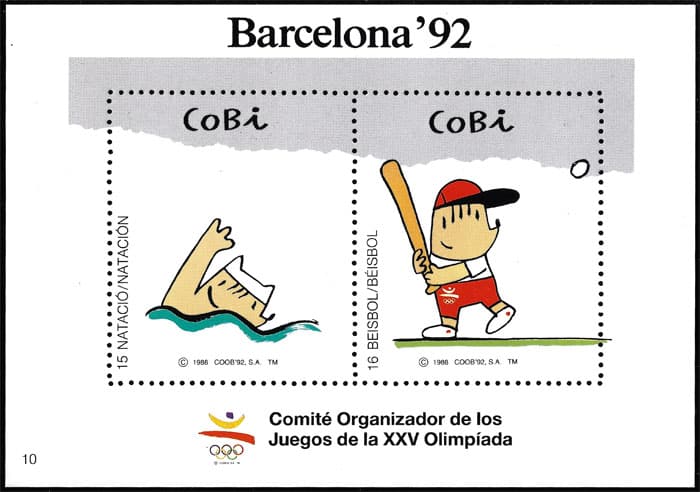
Boston Bees
The 1938 Boston Bees, led by manager Casey Stengel in his second year, finished with a 77–75 record and secured fifth place in the National League. That spring, the team trained in Bradenton, Florida, at McKechnie Field, marking their second and final year holding spring training there. Despite a relatively average season, the Bees featured strong performances from players like pitcher Lou Fette and catcher Al Lopez. McKechnie Field, surrounded by palm trees and packed with curious locals and northern transplants, offered an ideal setting for the Bees to sharpen their skills before heading north for the regular season.
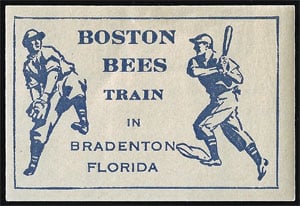
Baseball Centennial
We know today that Abner Doubleday may not have invented baseball in Cooperstown in 1839. Still, the centennial celebration in 1939 had ever MLB team wearing the Baseball Centennial logo on their uniform sleeve. A contest was held to create the official logo, and New York artist Miss Marjori Bennett was declared the winner. The player shown bears a likeness to Joe Dimaggio. The logo was alto turned into a commemorative stamp.
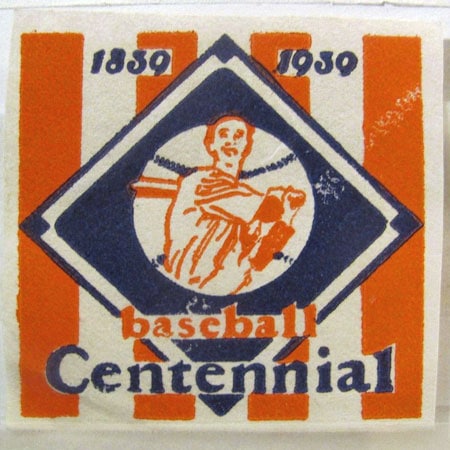
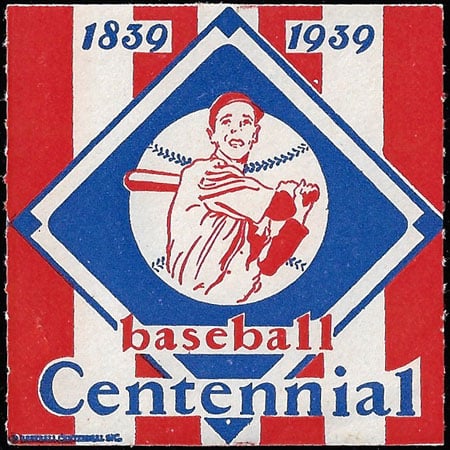
Boys Ranch
Boys Ranch, still active today and founded by Cal Farley in 1939, is a non-profit in Texas dedicated to helping at-risk youth. Providing a family-like environment, it focuses on life skills, education, and personal growth without government funding. Continuously adapting to current needs, its program includes academics, vocational training, and extracurriculars, equipping children for future success.
Fundraising to impact in child welfare, Boys Ranch has released seal stamps over the years, reflecting its ongoing commitment to at-risk youth. These stamps raise awareness about youth challenges and symbolize the ranch’s lasting positive influence in child development.
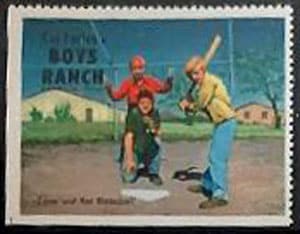
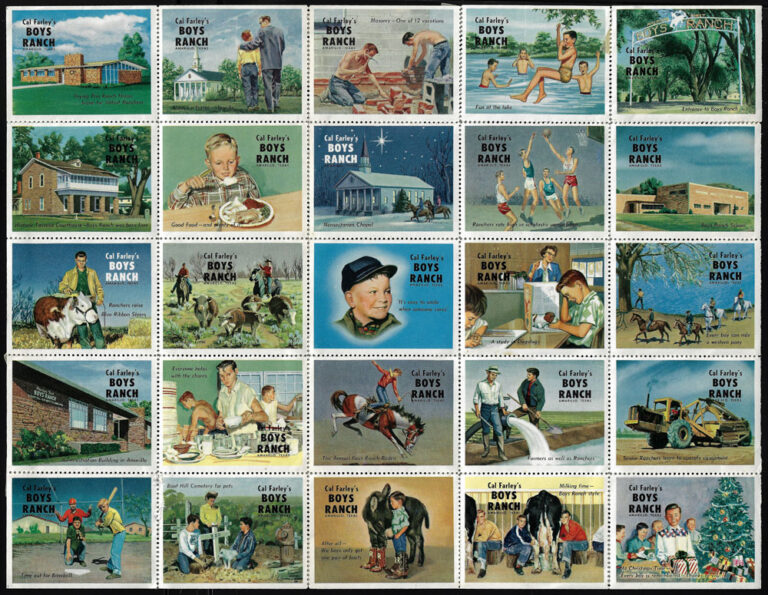
Boys’ Athletic League
The “Send a Boy to Camp” initiative by the Boys’ Athletic League (BAL) aimed to provide underprivileged boys with the opportunity to attend summer camps like Camp Sebago, Camp Orenda, Camp Kiwago, Camp Lanowa, Camp Wakonda, and Camp Kirby in New York.
To raise funds, BAL distributed mini stamp booklets from the 1940s through the 1960s. These booklets reflect changes in postal addressing. Earlier editions lack a ZIP code, while later ones include 10017, indicating they were printed after ZIP codes were introduced in 1963. The various versions are also perforated differently.
A panel featured a stamp showing three kids running—one with a baseball glove, another with a bat—symbolizing the sports and camaraderie at the camps. These camps offered a nurturing environment for outdoor activities and personal growth.
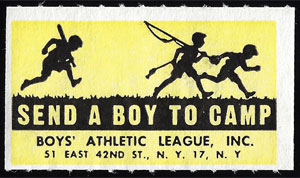
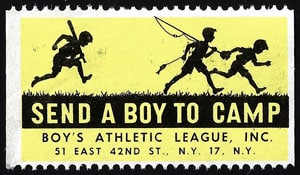
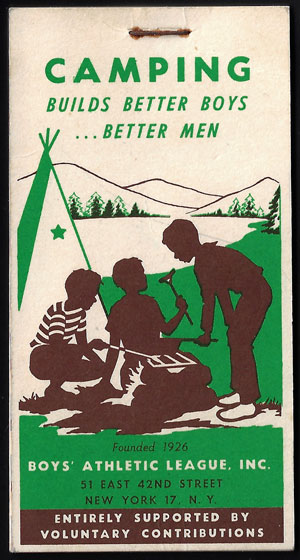
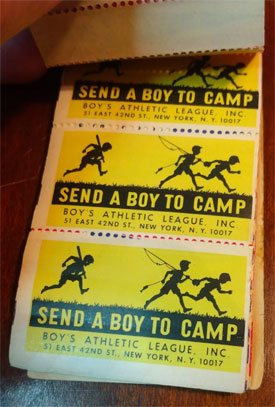
Boys Town
Boys Town provides life-changing youth care and health care services that meet each child and family exactly where they are. Boys Town kids started collecting and trading stamps in the 1930s, and the hobby grew. That led to the creation of their own collectable stamp sheets, given out as “thank you gifts” in return for charitable donations. Then came the Leon Myers Stamp Center – a museum located in the Boys Town Visitors Center.
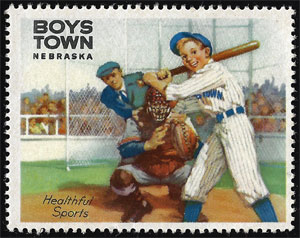
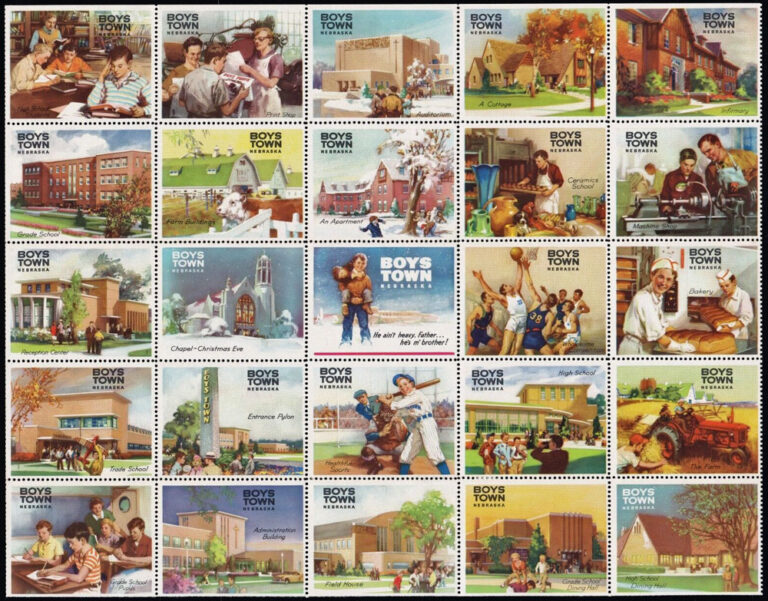
In 1953, a Ball of Stamps was started by D.O. Barrett, the first curator of the Boys Town Stamp Center, and the Boys Town Stamp Collecting Club. Kids began the ball with a core, and began licking and sticking non-valuable stamps around it. Ripley’s Believe It or Not featured the ball at 32 inches in diameter, weighing 600 pounds, and consisting of 4,655,000 postage stamps.
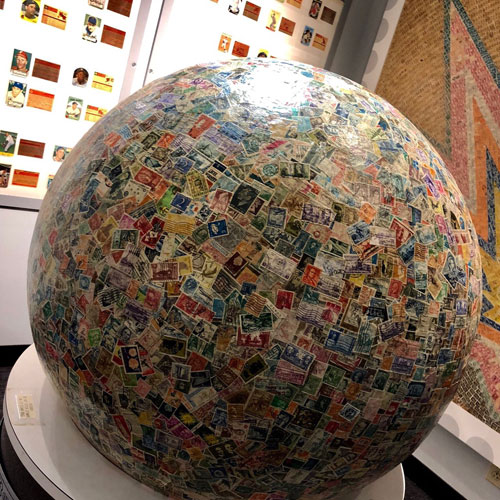
Chinese Professional Baseball League
The Chinese Professional Baseball League (CPBL) played their first season in 1990. During the 90’s, they issued stamps for award winners, players, and teams, including the Brother Elephants, China Times Eagles, Jungo Bears, Mercuries Tigers, Sinon Bulls, Uni-President Lions, and Wei Chuan Dragons. Below is just a sampling, as I’m sure there are others!
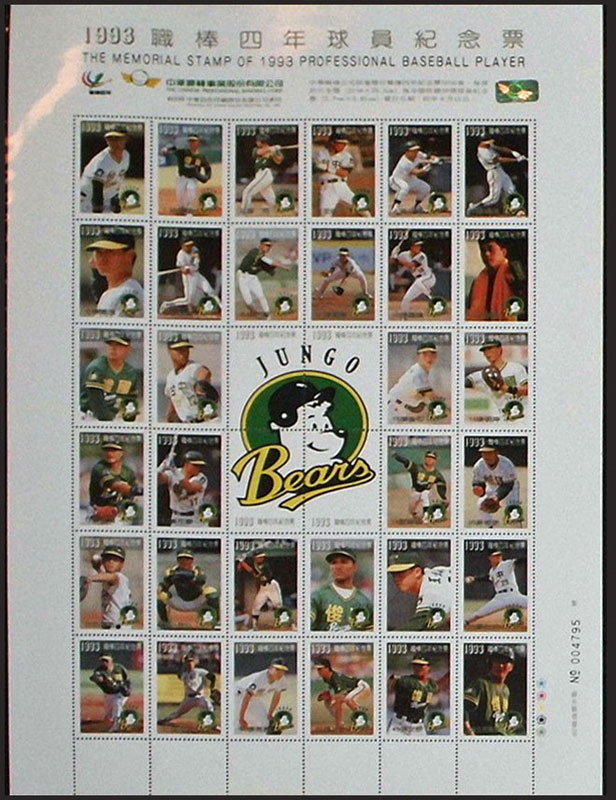
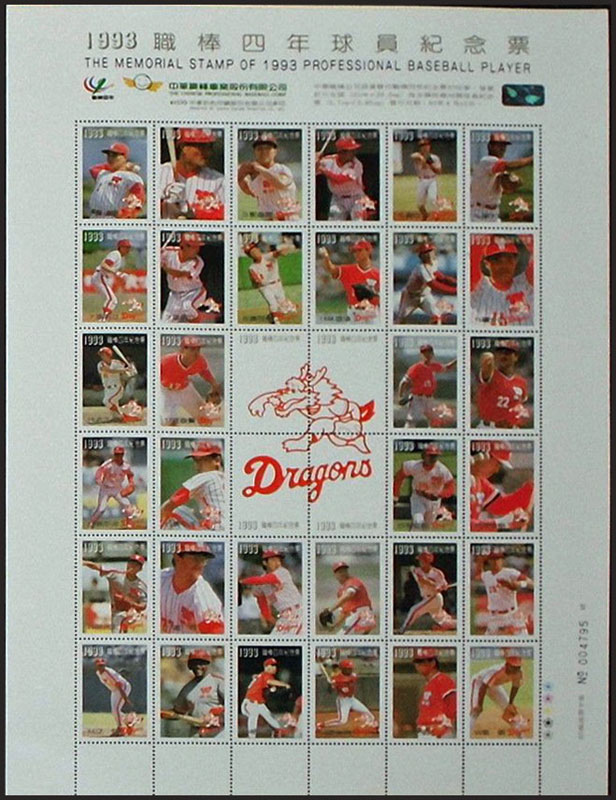
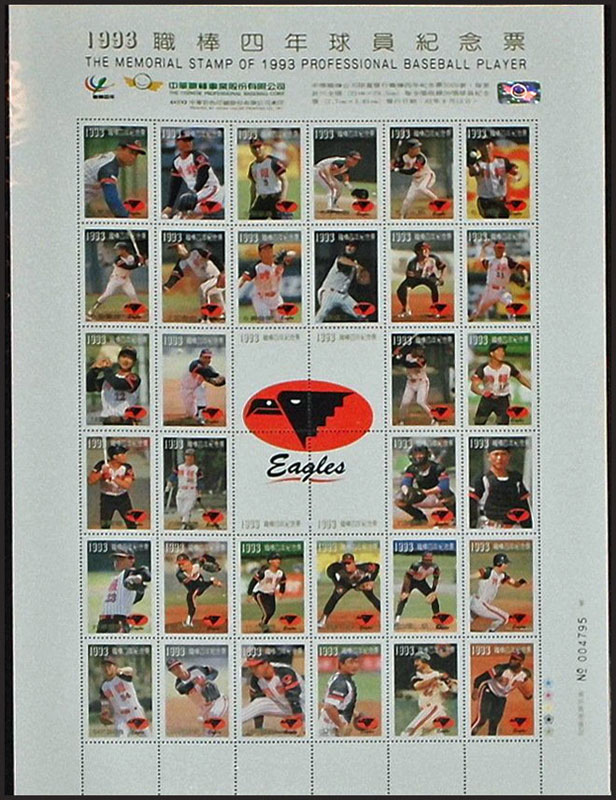
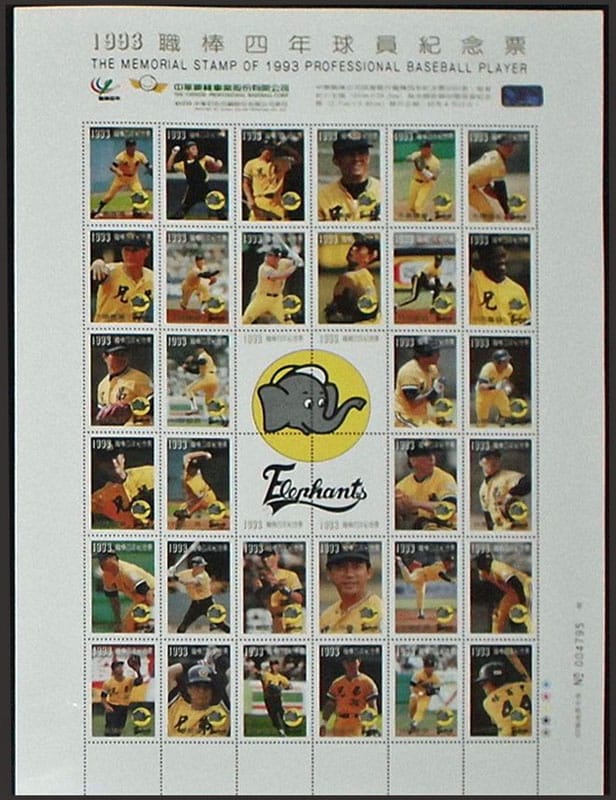
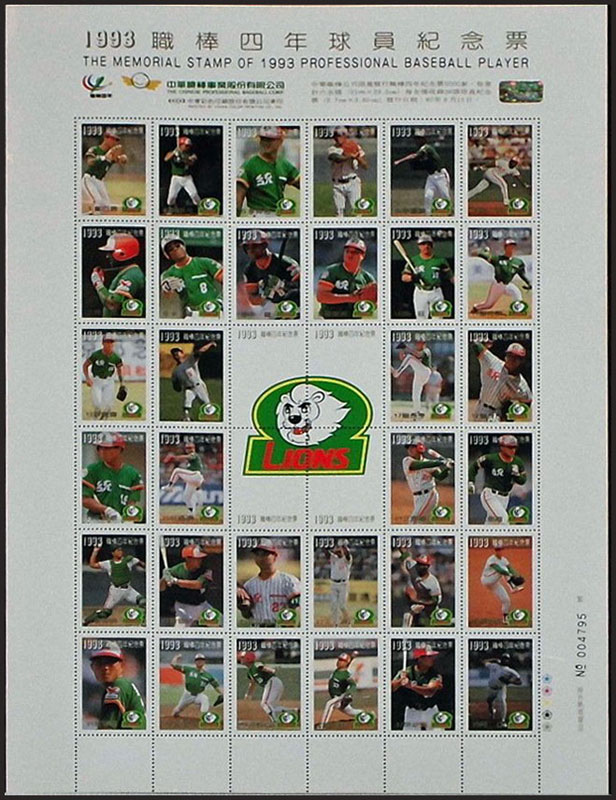
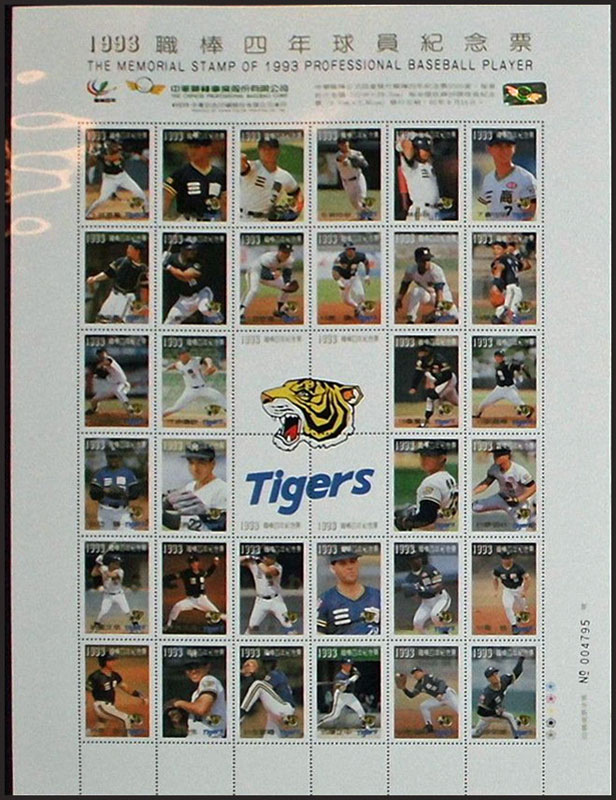
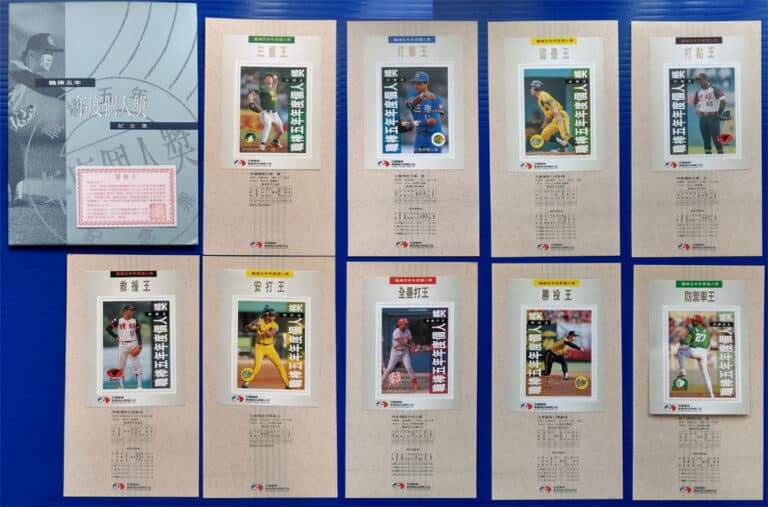
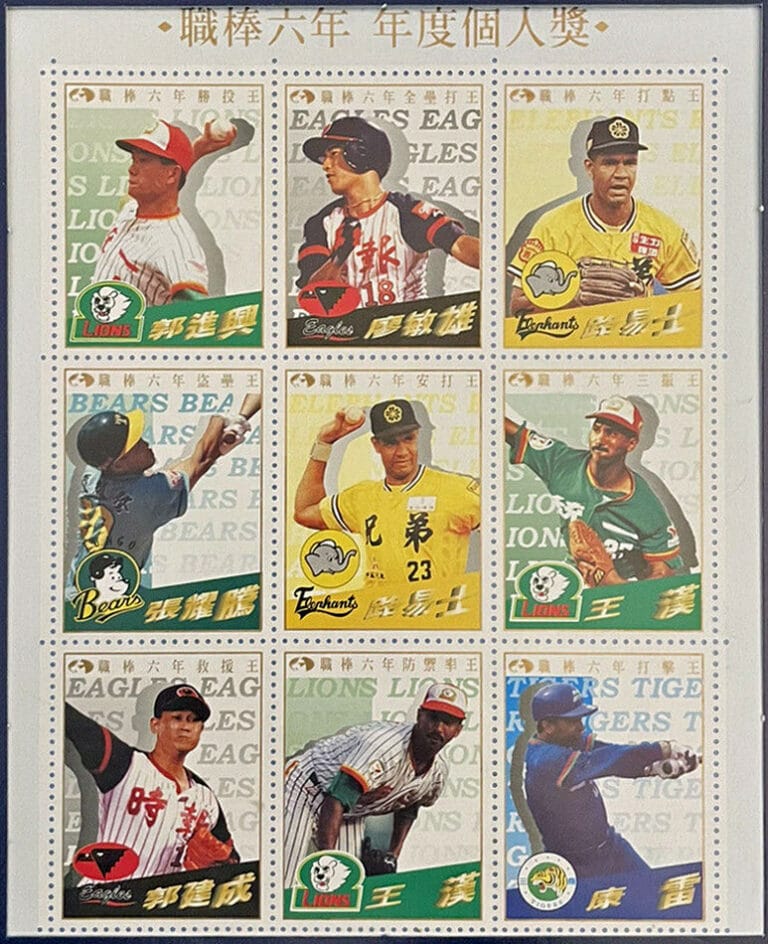
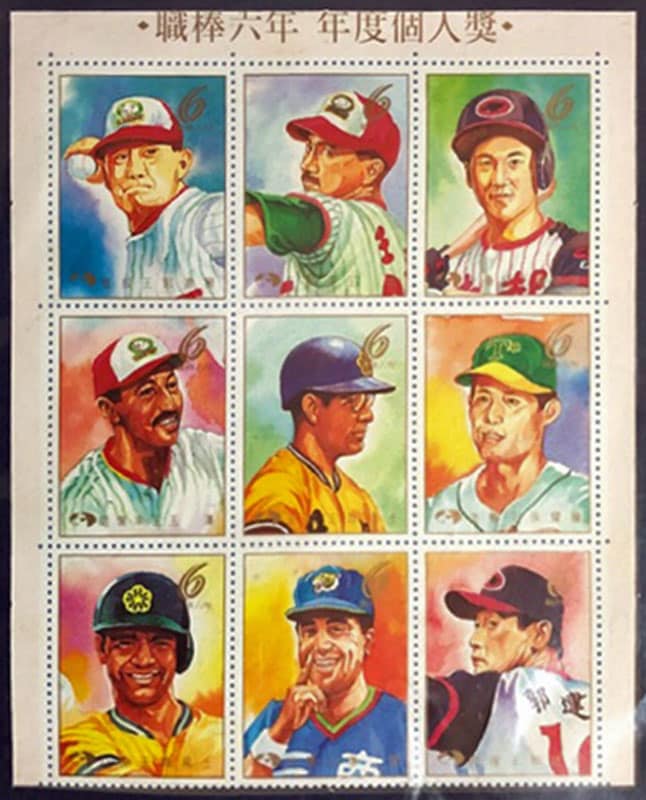
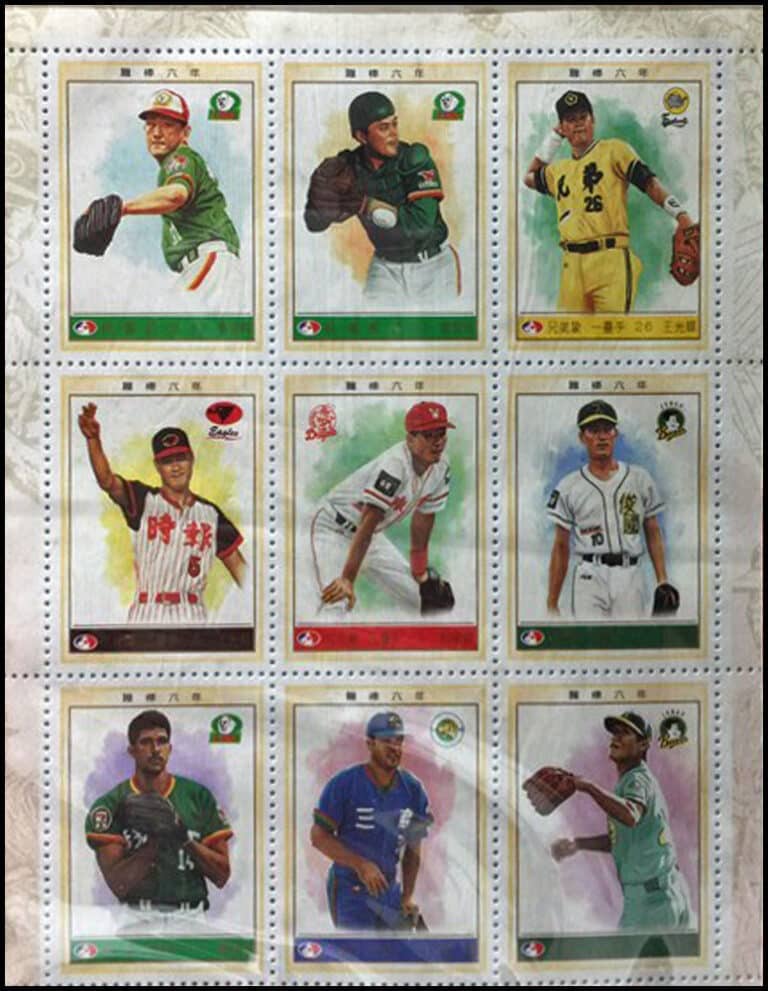
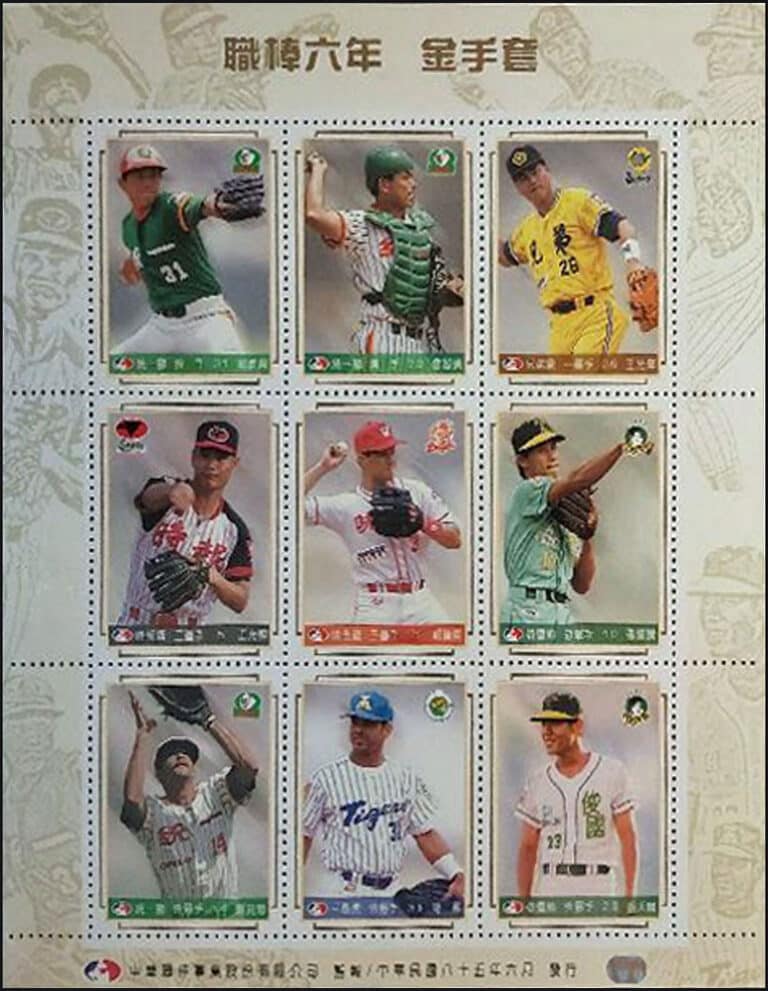
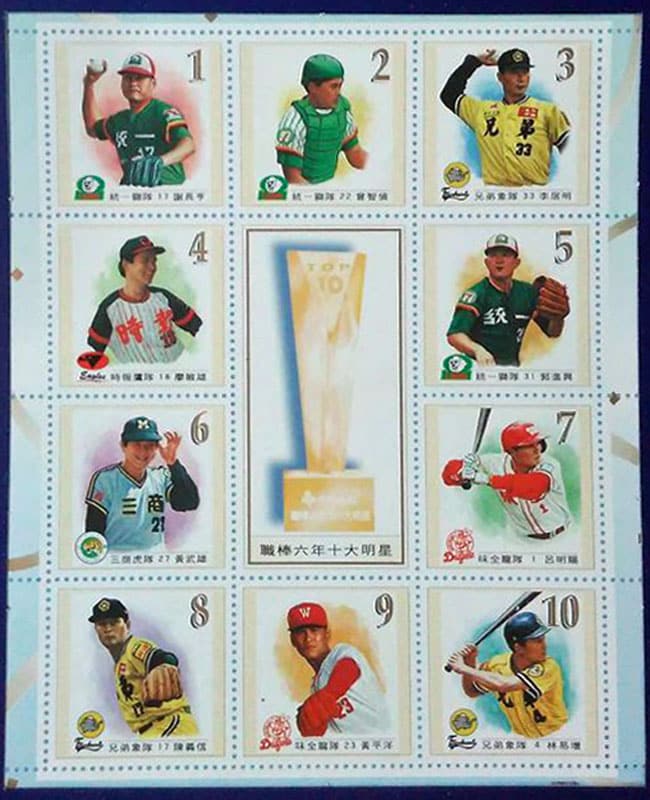
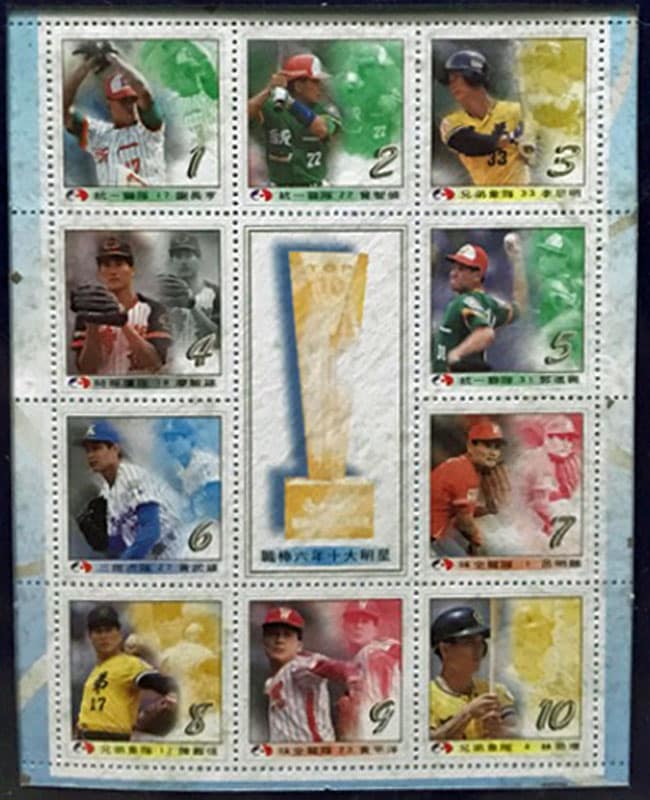
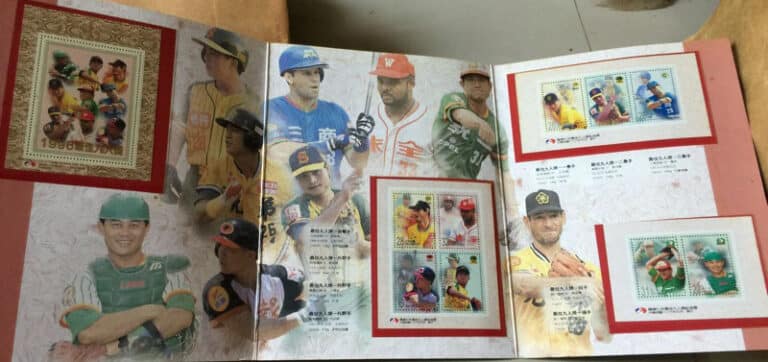
Cities Collection – Memphis, Tennessee
Circa 1923, the Memphis stamp from the Cities Collection is part of a 12-stamp set designed by Dick C. Rice. It features Martin Stadium, built in 1923, a landmark in Negro League baseball and a symbol of African American enterprise. The stamp’s message, “Memphis: As the supreme southern railway center and with the Mississippi River, is the first base for distribution to all points in the South and Southwest. Memphis rates afford best opportunities for northern and eastern manufacturers,” highlights Memphis as a pivotal transport and business hub.
The Cities Collection, showcasing cities like Wilmington, Delaware, Paterson, New Jersey, and Galveston, Texas offered a glimpse into America’s diverse urban landscapes. This series transcended traditional postal uses, serving as a creative medium for city promotion and a symbol of civic pride, encapsulating the distinct economic and cultural characteristics of these cities during that period.
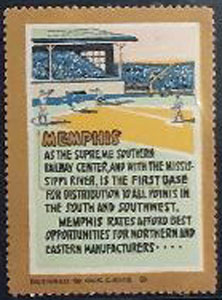
Dutch Boy Paints
Around 1915, Dutch Boy Paints creatively used stamps for advertising, featuring their iconic Dutch Boy logo character. Among these, two sports-themed stamps stood out: a baseball stamp with a pitcher on a grass field with the slogan “Strike ‘Em Out – Dutch Boy White Lead Disposes of Paint Troubles,” and a tennis-themed one stating “A Good Service – Painting Your House With Dutch Boy Lead.”
A century later, the perception of lead paint, once a key product of brands like Dutch Boy, drastically changed. Recognized as a health hazard, lead paint was banned in many countries due to risks like developmental delays in children. This shift highlights the evolution in public health awareness and consumer safety, transforming a once-celebrated product into a symbol of the importance of product safety and regulatory evolution.
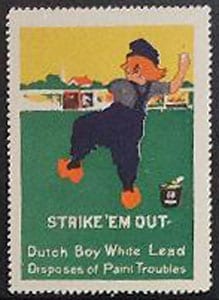
Easter Seals
Easter Seals stamps began being issued in 1934 as a fundraising initiative by the National Society for Crippled Children, now known as Easterseals. These stamps sold around Easter, and people would stick them on the back of mailed envelopes. This tradition was popular as it coincided with the season when people sent cards to friends and family. The first seal was designed by Cleveland Plain Dealer cartoonist J.H. Donahey. Easterseals rebranded from the National Society for Crippled Children in 1967, reflecting the public’s perception of the prior term.
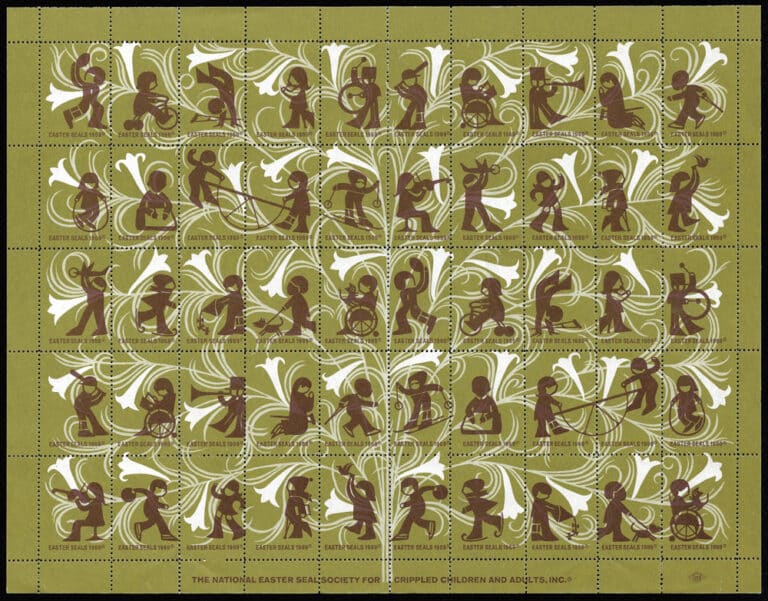
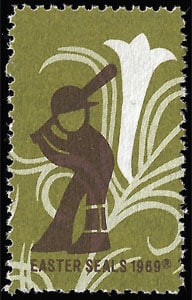
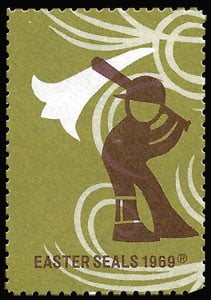
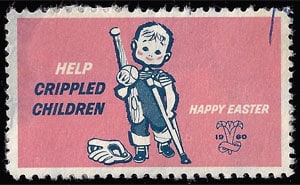
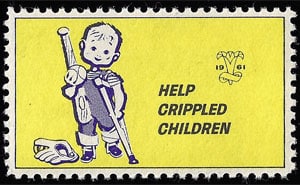
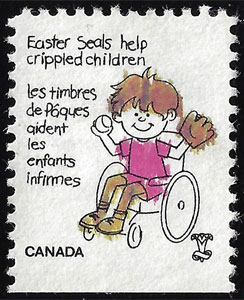
Eureka College Stamps
In 1915, Eureka College in Eureka, Illinois, known for being President Ronald Reagan’s alma mater, produced a series of 12 stamps primarily showcasing campus buildings, reflecting its rich architectural heritage. The collection also included “The Winning Run (Baseball),” a unique stamp that captured the essence of the college’s sports culture and campus life during that period.
Today, Eureka College continues to maintain a baseball program in NCAA Division III. This continuation of the baseball tradition at Eureka College, along with its ongoing dedication to academic excellence and community involvement, reflects the institution’s enduring legacy.
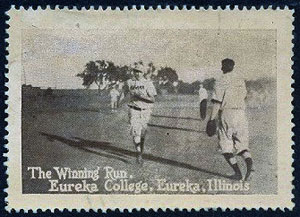
European Baseball Championship
In 1983, the Federazione Italiana Baseball Softball issued a series of stamps to commemorate the 18th European Baseball Championship in Italy and celebrate the country’s victory. The first release was a souvenir sheet featuring a batter at the plate against a stadium backdrop.
A four-stamp sheet followed, titled XVIII Campionato Europeo Di Baseball, depicting stylized baseball players. After Italy’s title win, a “Champions” overprint version was issued, with “Italia Campione” across the stamps.
Lastly, a six-stamp sheet showcased a baseball surrounded by colorful stars, emphasizing the event’s significance and baseball’s growing popularity in Europe. These stamps remain a lasting tribute to the games and Italy’s baseball dominance.
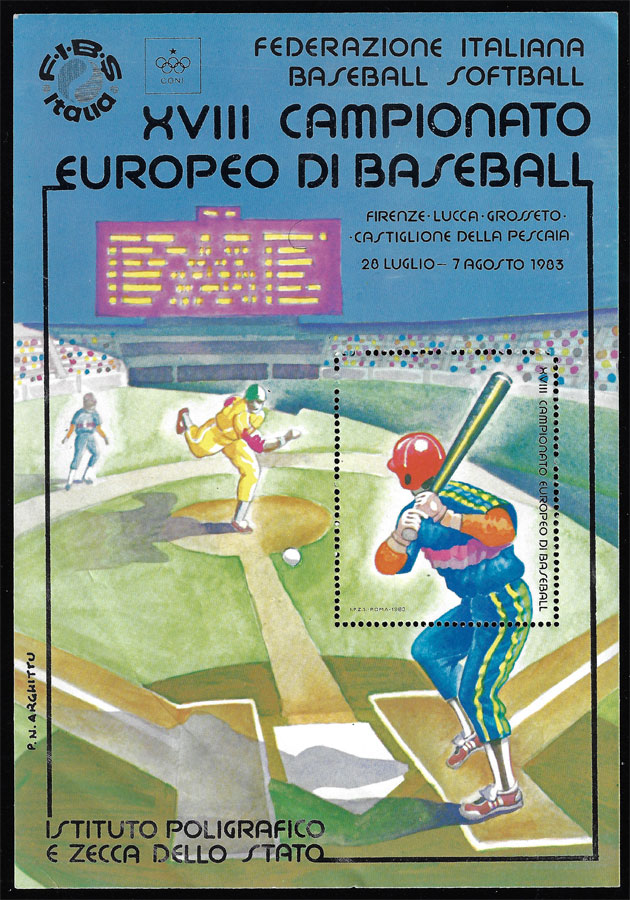
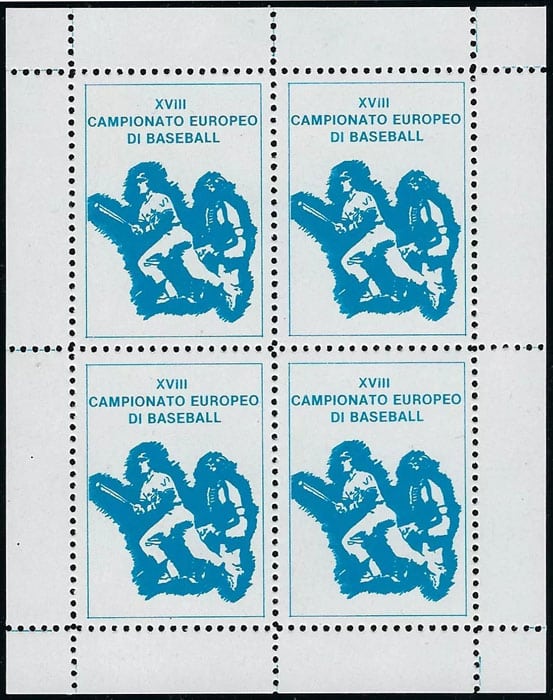
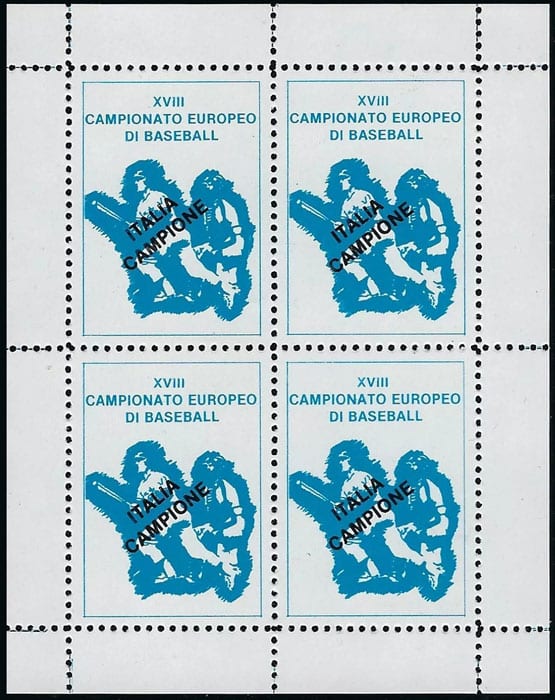
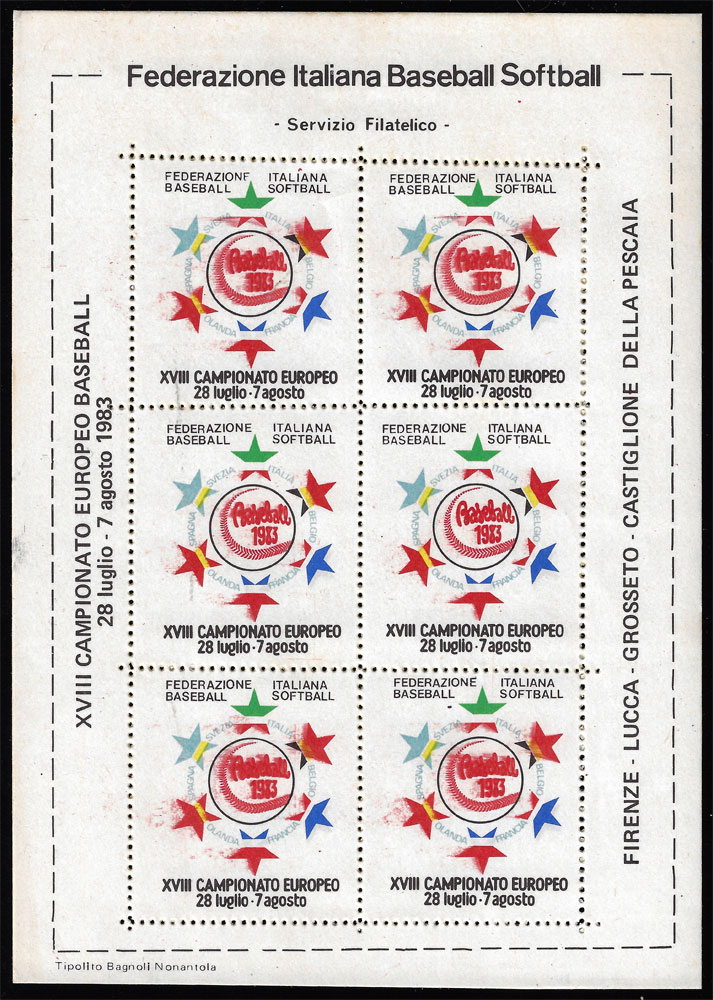
FAO Schwarz
The FAO Schwarz poster stamp set, issued in 1915, is advertising history from the oldest toy store in the United States. Founded in 1862 in Baltimore before moving to New York City in 1870, FAO Schwarz created this stamp set to promote its diverse offerings at the iconic 303 Fifth Avenue location. The “Sport Goods” stamp, featuring a classic baseball scene with a batter, catcher, and players, reflects the store’s connection to early 20th-century America, when sports and play were becoming deeply rooted in everyday life.
FAO Schwarz faced challenges over the years, including bankruptcy in 2003 and the closure of its Fifth Avenue store in 2015—exactly 100 years after this stamp set was released. Reinvigorated by ThreeSixty Group, the store reopened in 2018 at 30 Rockefeller Plaza, continuing its legacy of delighting generations. The 1915 stamp set remains a cherished relic of FAO Schwarz’s rich history.
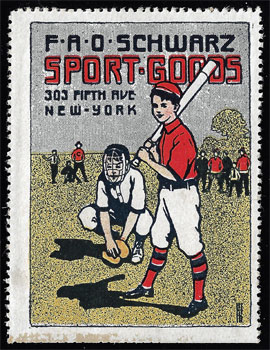
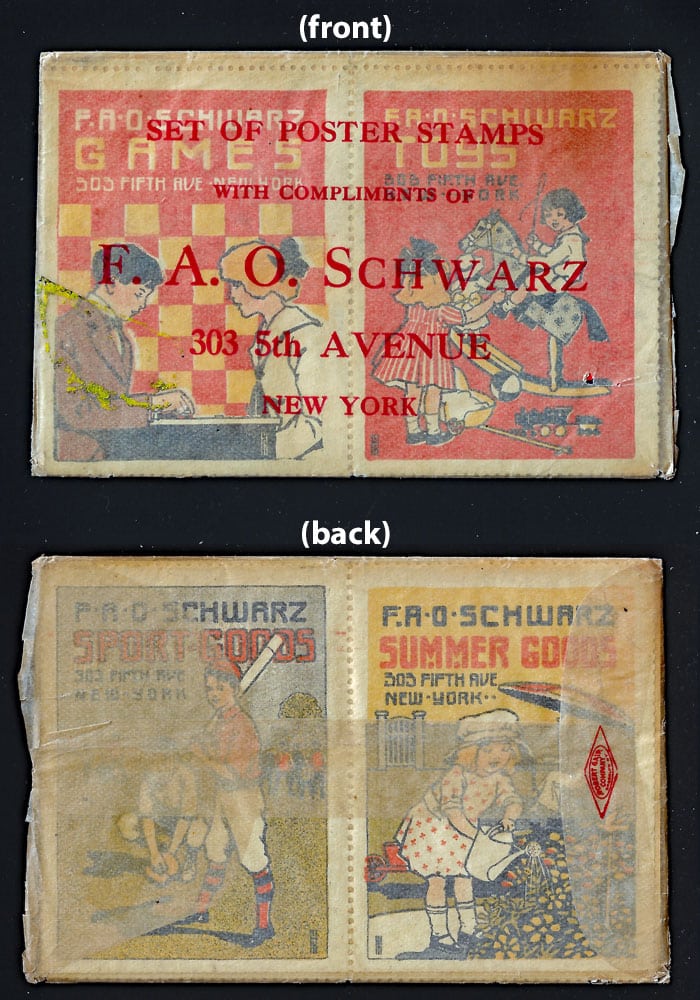
Father’s Day Charity Seals
From the 1940s to the 1960s, Father’s Day Charity Seals featured unique designs each year, with two notable stamps embracing baseball to symbolize American family unity. One stamp, bearing “Happy families make a peaceful world” and “Cheers for Dad – the toast of the party,” captures a father and son bonding over a new catcher’s mitt, epitomizing father-son relationships.
The second stamp, including “Grandpa’s too” and “Remember the day,” depicts a father and his children playing “hand over hand up the bat,” a game symbolizing cooperative spirit. With “Teamwork: Juvenile integrity starts at the house,” it underscores the importance of family in instilling values of cooperation and integrity, highlighting the role of both fathers and grandfathers in nurturing these virtues through shared activities like baseball.
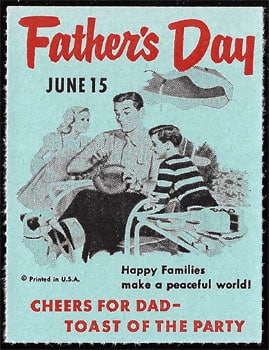
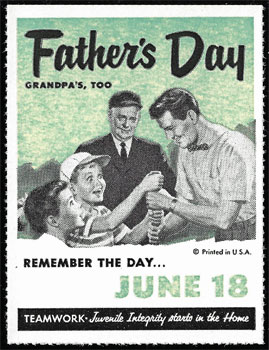
Forest Park Museum
The 1939 Forest Park Museum Centennial of Baseball Commemorative Poster Stamps Book & Checklist celebrates a century of baseball history from 1839 to 1939. The museum was founded by Emery Parichy in 1934, and this booklet honors significant milestones and personalities in baseball. The museum, located in Forest Park, Illinois, was the first baseball museum and played a crucial role in preserving baseball records, pictures, autographed memorabilia, and uniforms.
In 1939, the museum published a set of commemorative stamps created by Al Demaree, a former Chicago Cubs pitcher and professional cartoonist. These “Centenial of Baseball” stamp (spelled incorrectly) were issued in panes of 25, each featuring important events and figures in baseball history, with a short career biography of each Hall of Famer. The booklet also includes a “Baseball Quiz” with answers scattered throughout, enhancing its educational value.
The booklet features a detailed history of the museum and its founder, Emery Parichy, who significantly contributed to the creation of the Baseball Hall of Fame in Cooperstown. Parichy’s collection, which included priceless relics like autographed bats, gloves, and uniforms, eventually became part of the Hall of Fame. Additionally, Parichy founded the National Girls Baseball League in 1944, showcasing his lasting impact on the sport beyond this commemorative booklet.
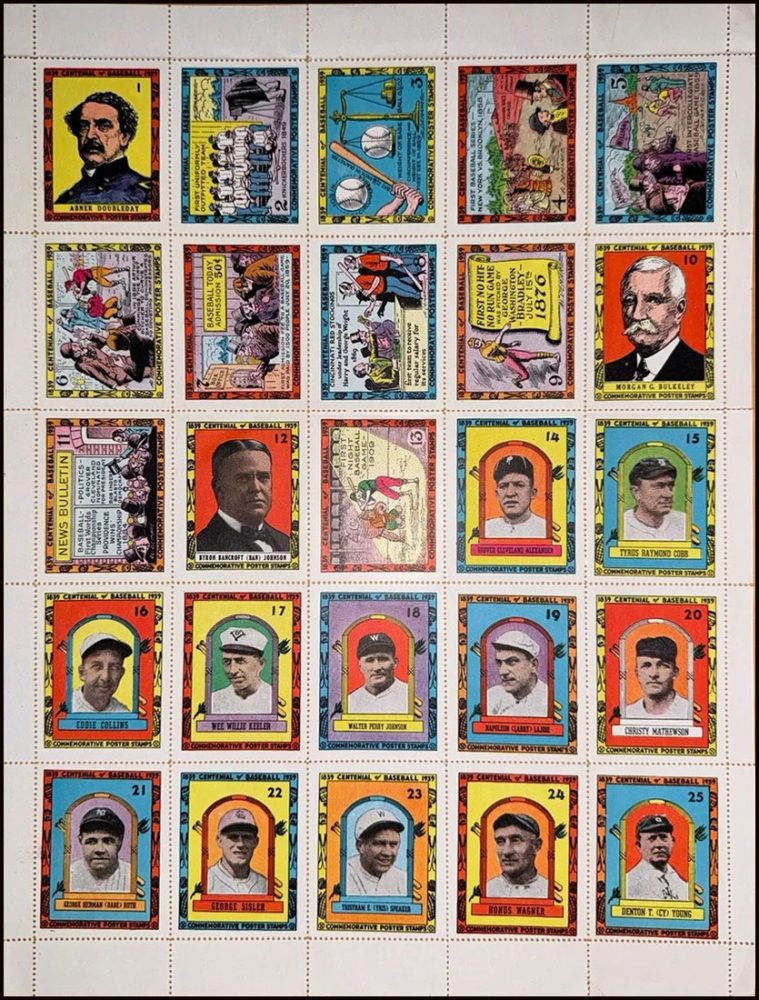
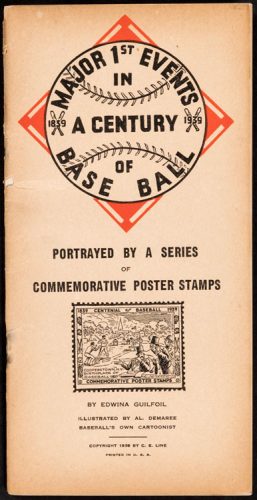
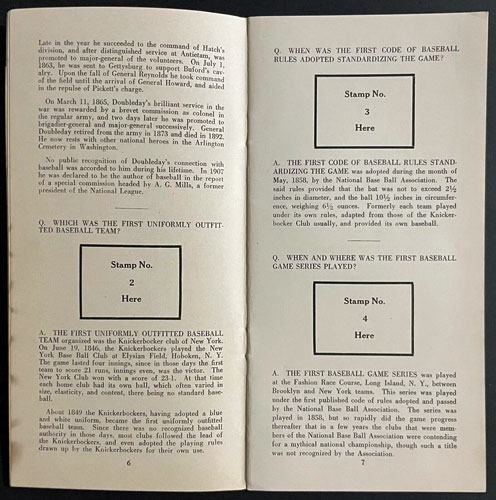
The Great Allentown Fair
The Great Allentown Fair is an annual fair and agricultural show held at the Allentown Fairgrounds in Allentown, Pennsylvania and operated by the Lehigh County Agricultural Society. It is one of the oldest fairs in the United States, first held in 1852 to showcase agricultural advancements and to entertain patrons. This stamp promotes the 1919 fair.
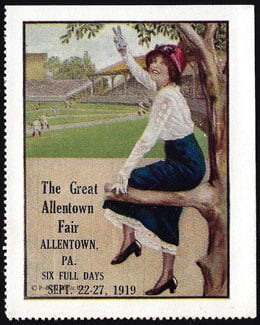
Hinds Honey & Almond Cream
In the early 1900s, A. S. Hinds Co. produced a series of twenty-four colorful lithographed poster stamps to market Hinds Honey and Almond Cream for sunburn. Hinds supplied one hundred sets of these stamps, with six stamps per set, to druggists throughout the United States for free, which the druggists could then sell to consumers for two cents a set or five cents for four sets.
In return, A. S. Hinds Co. required that the druggists allow them to use their mailing lists so that the company could dispense Hinds Honey and Almond Cream to customers. This baseball stamp is believed to have been released in 1915.
The back of the stamp reads “Protects and improves the complexion. Cleanses and purifies the skin. Heals irritated, eruptive conditions. Quickly relieves sunburn, windburn, chapping. Softens and freshens dry, sallow skin. Is not greasy; cannot grow hair. Selling everywhere. Bottles, 50c. Cold Cream tubes, 25c. Insist on having HINDS CREAM.”
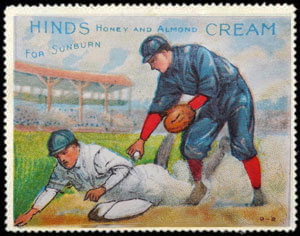
History of Chicagoland
The “History of Chicagoland” series by Jewel Food Stores, released in 1939, features 100 poster stamps depicting Chicago’s history and scenery. These stamps were distributed weekly, with each one numbered and explained by a brief paragraph. Shoppers received stamps with purchases of 25¢ or more, and special “Jewel Star” stamps were available with certain sale items. Collectors could use albums with designated spaces for each stamp, making shopping a historical exploration of Chicago.
One notable stamp in this collection honors Cap Anson, a key figure in Chicago baseball history. Adrian “Cap” Anson, a player and manager for the Chicago White Stockings, batted over .300 during his career.
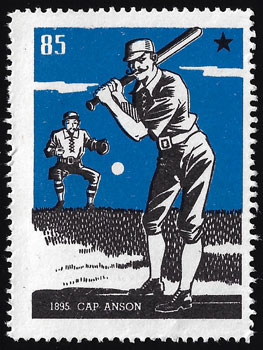
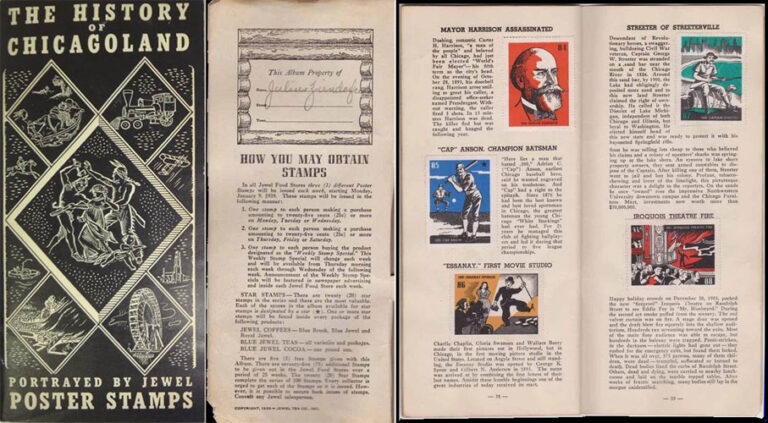
Italian Palla a Base Federation (FIPAB)
This early-1950s baseball stamp honors the Italian Palla a Base Federation (FIPAB) for advancing baseball and softball in Italy.
Formed in late 1948, FIPAB emerged from the union of the Italian Softball League and the Italian Baseball Association. By January 29, 1950, it had merged with the Italian League Baseball (LIB), establishing FIPAB. Recognized by CONI in 1953 as a member federation and in 1957 as an effective federation, it adopted its current name, the Italian Baseball and Softball Federation (FIBS), in 1970.
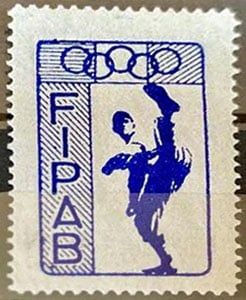
Kentucky the Beautiful
The Kentucky the Beautiful stamp set, issued in 1937 to celebrate the 145th anniversary of Kentucky’s statehood, highlights the state’s rich heritage through iconic landmarks and influential figures. One notable stamp features Kentucky’s Capitol at Frankfort, alongside a portrait of Albert Benjamin “Happy” Chandler Sr. Chandler served as a U.S. Senator, the 44th and 49th governor of Kentucky, and later as the second commissioner of baseball.
During his tenure as commissioner, he oversaw Jackie Robinson’s historic breaking of Major League Baseball’s color barrier, a legacy that earned Chandler induction into the Baseball Hall of Fame in 1982.
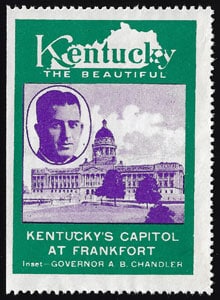
Lord & Taylor
This stamp as used to advertise the Lord & Taylor department store in New York for their boys’ clothing on the fourth floor. While the date in unknown, it is estimated to have been from the early 1900’s.
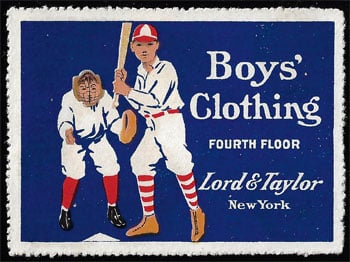
MAD Magazine
MAD was an humor magazine from 1952 to 2018. It was highly influential and affected the future of satirical media. Issues were often augmented with novelty stickers and stamps, and those occasionally placed baseball at the butt of the joke.
As reference: The song Mrs. Robinson was written for the movie, The Graduate, by Simon & Garfunkel. The film is about a middle-aged woman who seduces a much younger Dustin Hoffman. The famous song line, “Where have you gone Joe DiMaggio?” was used to represent heroes of the past – not about Joe hooking up with an older Mrs. Robinson. It should be noted that Marilyn Monroe was 12 years younger than Joltin’ Joe.
Humbug was a humor magazine published from 1957 to 1958, edited by Harvey Kurtzman, the former editor at MAD, so I’m throwing this in the same category.
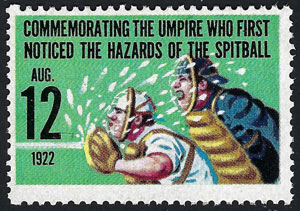
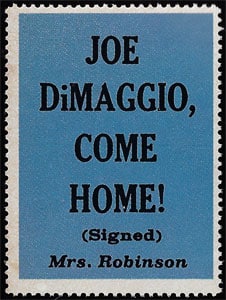
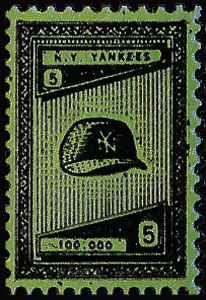
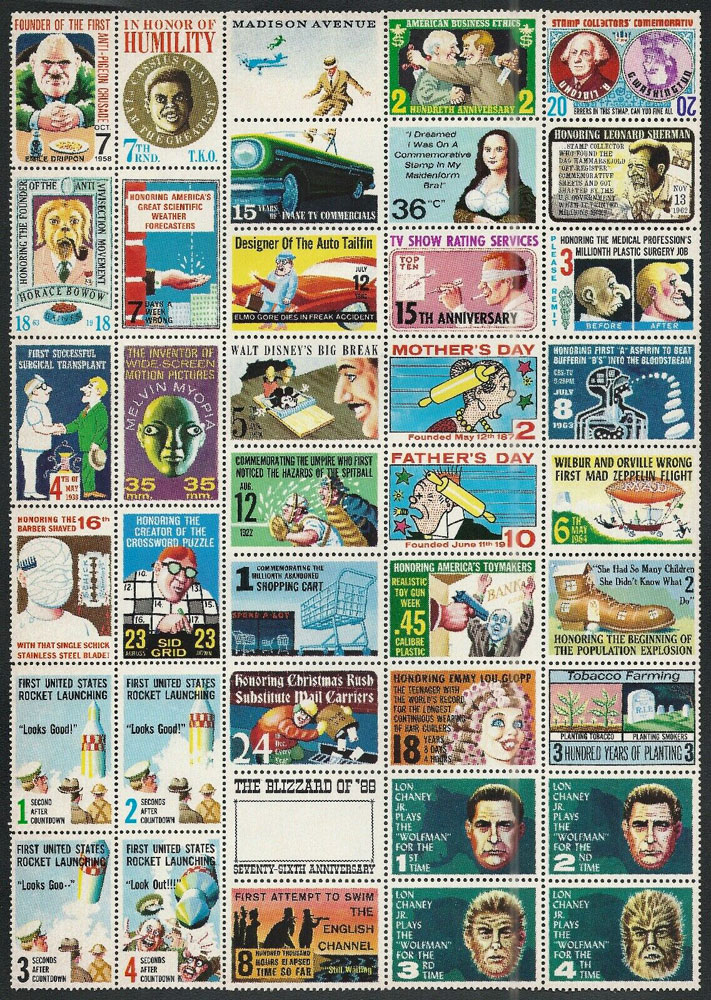
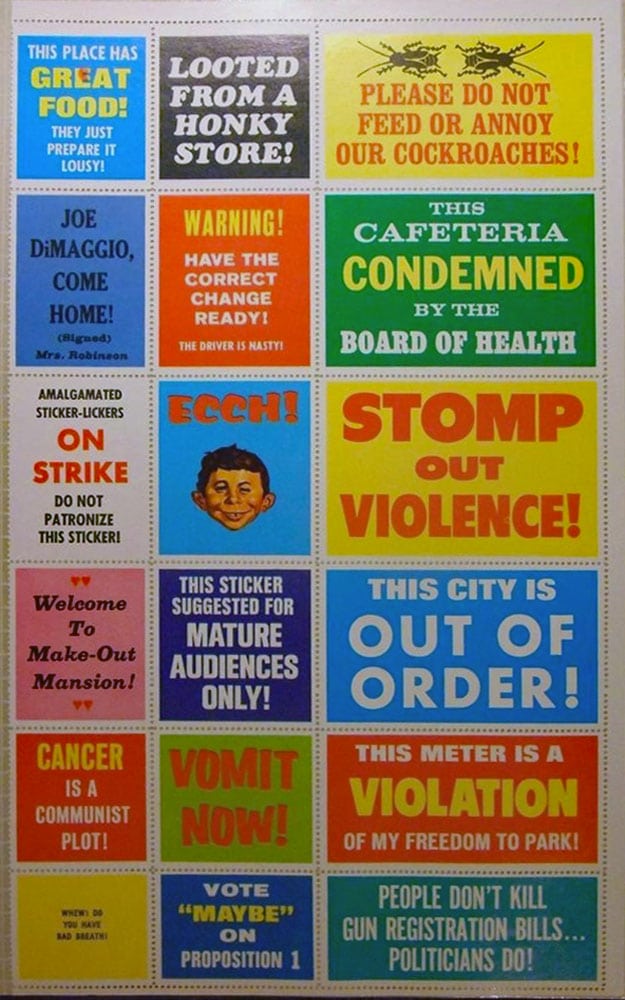
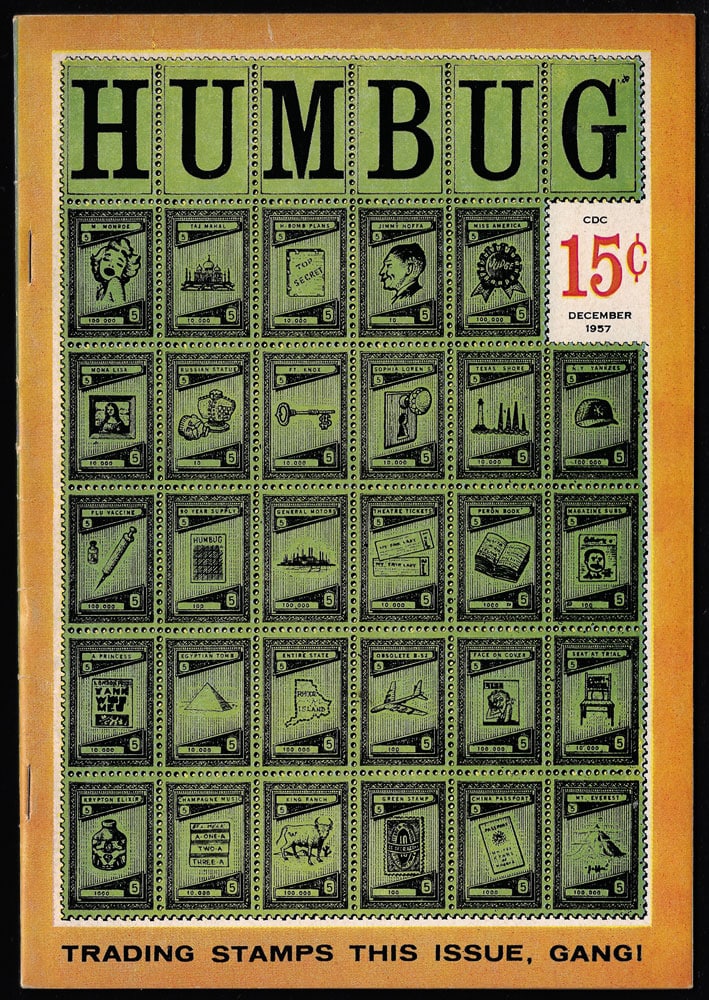
Park Ridge School for Girls
Founded in 1877, the Park Ridge School for Girls, originally the Illinois Industrial School for Girls, was a trailblazer in women’s education. It moved to Park Ridge in 1908, adopting a holistic approach to educating young women, which included life skills and academic education.
The school’s early 1900s stamp, featuring girls playing baseball, symbolizes its progressive ethos. This unique imagery for the time represents the school’s dedication to challenging conventional norms and promoting physical activity alongside intellectual growth for young women. The school’s legacy, despite its closure in 2012, continues to inspire through its historical contributions to women’s education and welfare.
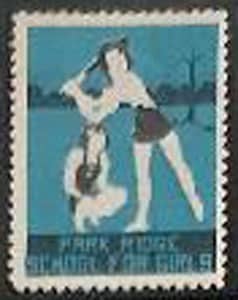
The Philatelic Society of Pittsburgh
The Philatelic Society of Pittsburgh dates back to 1888, with their current name coming into use in 1914. These commemorative stamps, issued a decade apart, honor the Pittsburgh Pirates and Pittsburgh Steelers, both of whom played at Three Rivers Stadium at the time.
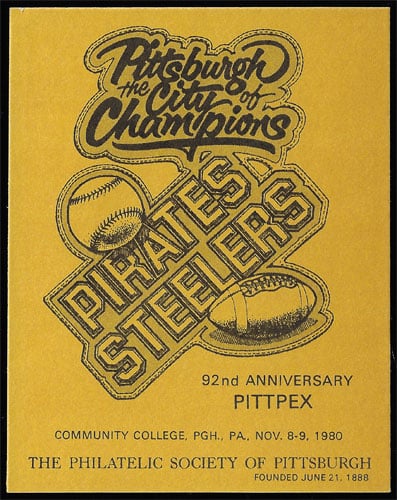
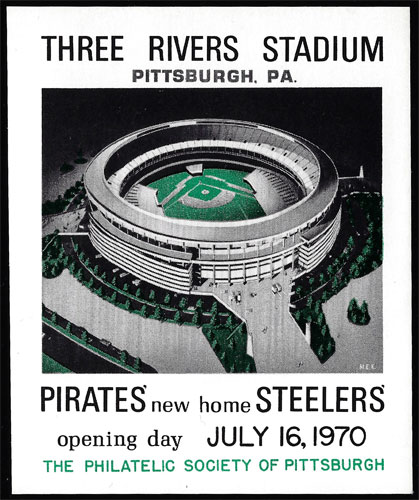
Rocky Mountain Stamp Show
This set of two commemorative souvenir sheets, released during the 2013 Rocky Mountain Stamp Show held from May 17-19 in Denver, Colorado, celebrates significant moments in Cuban baseball history.
Organized by the International Cuba Philatelic Society, the event was dedicated to “Beisbol Aficionado Cuba,” paying tribute to the rich heritage and enduring popularity of baseball in Cuba. Each sheet in this collection features two stamps, artistically designed to capture the essence of Cuba’s storied relationship with the sport.
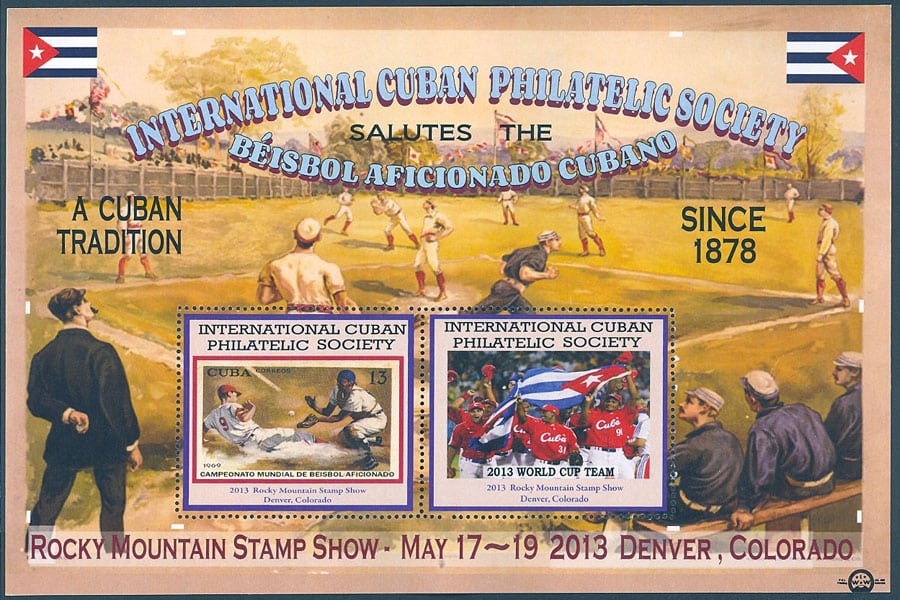
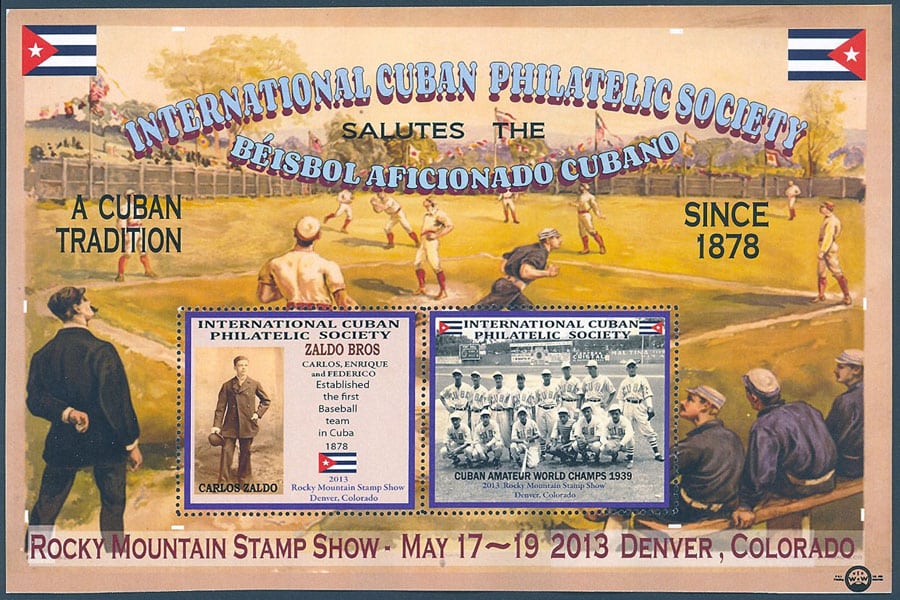
The Saturday Evening Post
This commemorative stamp features an April 24, 1915 Saturday Evening Post cover illustrated by Norman Rockwell, one of his earliest for the magazine. The image shows a young boy in a Red Sox uniform posing confidently in front of a mirror, reflecting Rockwell’s classic charm and storytelling.
The Saturday Evening Post, published from 1821 to 1969 (with revivals afterward), was a widely read illustrated weekly known for its iconic covers. This stamp honors both the magazine’s influence on American culture and Rockwell’s enduring legacy as a premier illustrator.
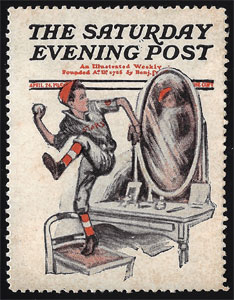
See Them At St. Petersburg, Florida
These vintage promotional stamps, printed in both black and red ink variations, were created to advertise spring training games in St. Petersburg, Florida. Taken at Waterfront Park, they were likely issued in the 1930s or early 1940s, during the years when Major League teams used the park for spring training.
Although some believe these stamps may be connected to the New York Yankees, who trained at Waterfront Park from 1925 to 1942 and again from 1946 to 1950, it is not definitively known which team they were produced for. They also could have been created for the Boston Braves (1922–1937) or the St. Louis Cardinals (1938–1942), both of whom also held spring training at the same venue. The red version, in particular, has led some to speculate a connection to the Cardinals.
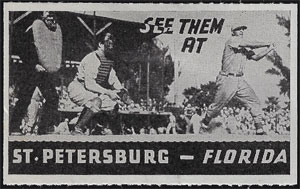
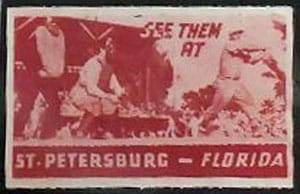
Shine for ’39
In 1939, O. Casperson and Sons launched a series of 348 poster stamps for the Postamp Pageant of San Francisco, along with 12 additional stamps for the San Francisco Fire Department, under the “Shine for ’39” tagline. These stamps were available by merchants carrying Buttercup Butter or Casperson’s eggs. One issue from the set was released every two weeks to merchants. The series was also available for $2.00 from the Poster Stamp Publishing Company in Chicago or the Postamp Publishing Company in San Francisco. While 50,000 sets were produced, they are extremely rare to be found today.
An accompanying album provided a space and brief historical sketch for each stamp, offering a complete chronological history of San Francisco from 1542 to 1939 as authored by Charles Caldwell Dobie. The collection captures significant events and milestones, making it a unique and picturesque documentation of the city’s past.
Among the collection, stamp #112, titled “First Baseball Game,” highlights baseball’s early days.
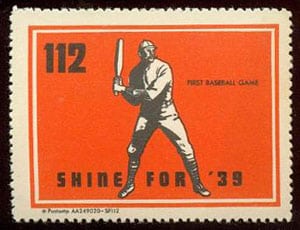
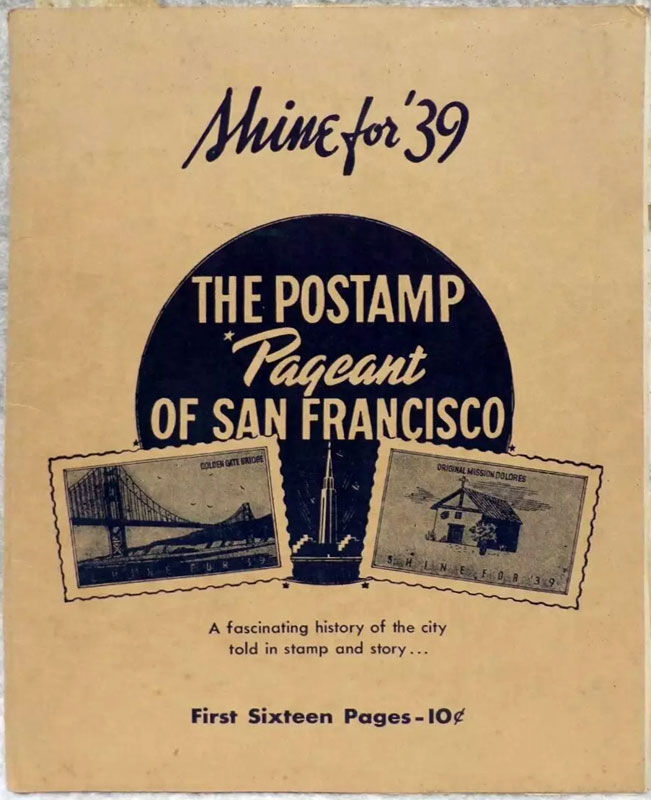
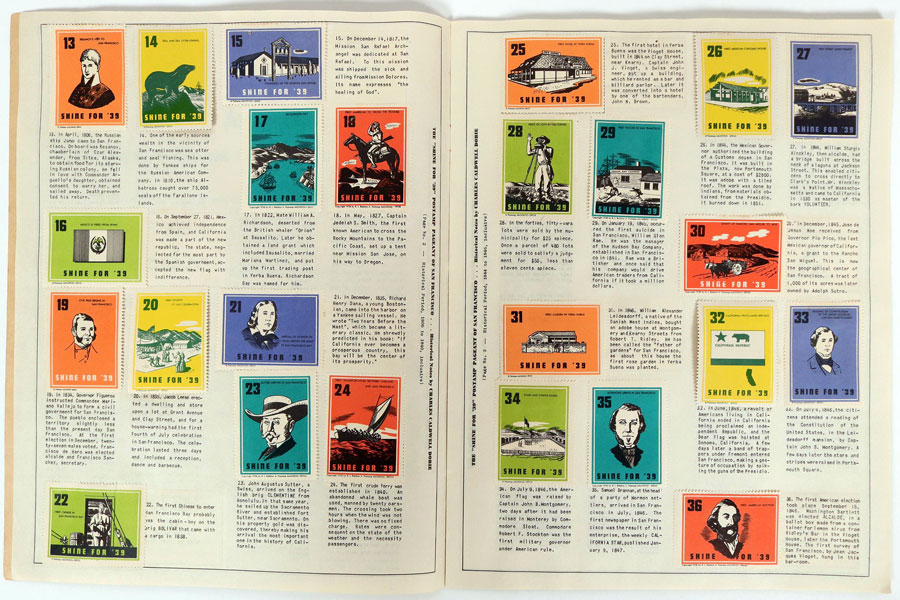
Smokey Bear
The Smokey Bear campaign, initiated in 1944, is one of the most enduring and influential public service campaigns in the United States, focused on wildfire prevention. Created by the U.S. Forest Service, the Ad Council, and writer-artist Albert Staehle, the campaign features Smokey Bear, a character that has become synonymous with forest fire prevention. Smokey’s iconic slogan, “Only YOU Can Prevent Forest Fires,” later updated to “Only You Can Prevent Wildfires,” has played a crucial role in raising public awareness about the dangers of uncontrolled fires and the importance of responsible fire management.
To further promote this message, the U.S. Postal Service issued commemorative stamps featuring Smokey Bear. A notable 1968 stamp, part of these efforts, was titled “Smokey’s Friends Don’t Play With Matches.” This stamp depicted a baseball scene with a batter and catcher, aiming to engage a younger audience in the campaign’s fire prevention message. These stamps have played a significant role in extending the campaign’s influence and reach.
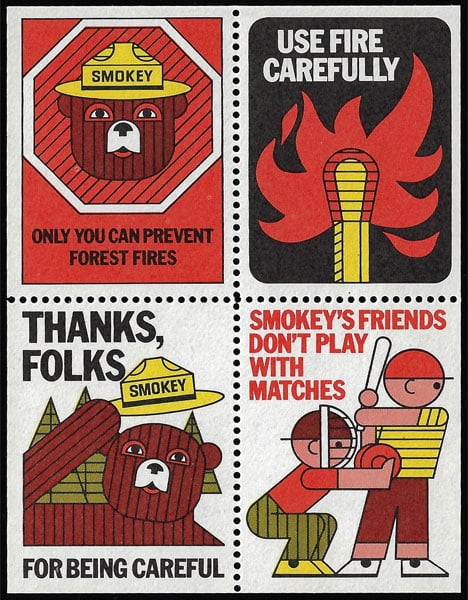
Sports Magazine Subscription Coupons
Many sports publications include stamps within the publication as subscription offers. For instance, it shows the newsstand price and subscription price. To get readers’ attention, athletes from prior covers are often shown. While this tactic has been taken by many magazines, it is most notable in baseball circles with Baseball Digest (the longest-running baseball magazine in the nation), Children’s Digest, and Sport.
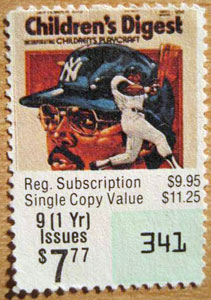
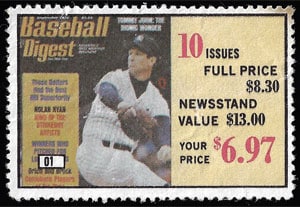
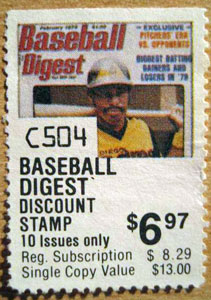
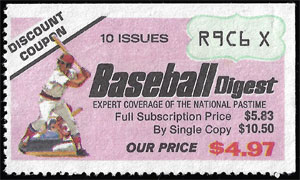
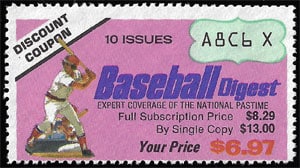
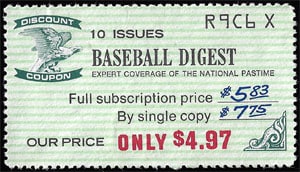
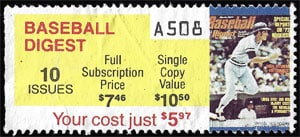
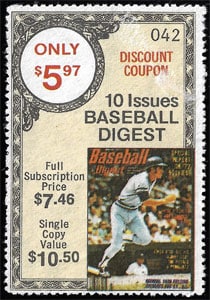
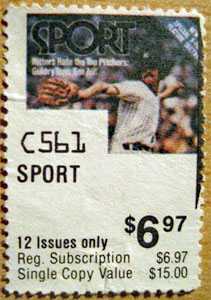
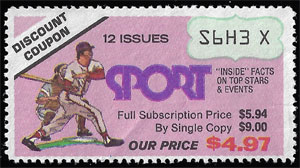
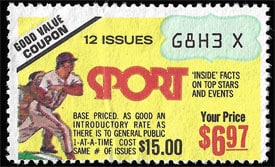
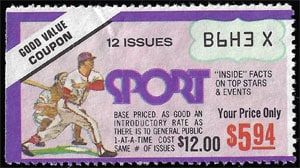
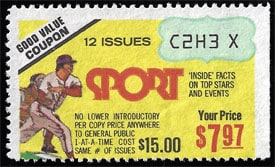
Taiwan Anti-Tuberculosis Association (TATA)
The Taiwan Anti-Tuberculosis Association (TATA), with a mission and logo reminiscent of the American Lung Association, is thought to have issued a series of four baseball-themed seal stamps. The exact year of their release is unclear. These stamps, believed to support tuberculosis awareness and fundraising, uniquely combine sports imagery with health advocacy, reflecting TATA’s dedication to combating tuberculosis in Taiwan.
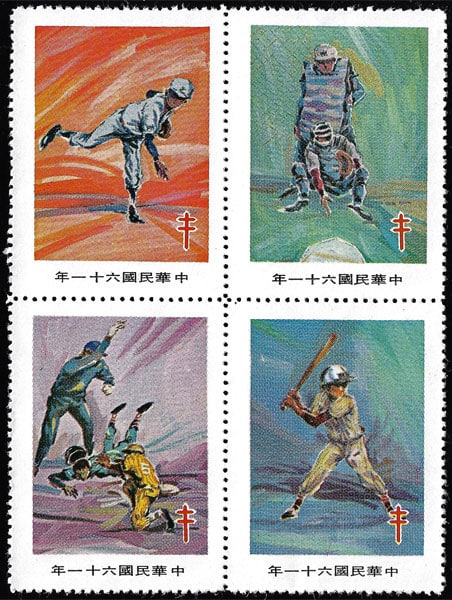
Texas League of Safety
These were issued in 1938 to promote safety in driving. The stamps were designed as decorative add-ons to seal the backs of envelopes or packages. The set contained 30 mostly non-sports issue, and featured people and situations with slogans related to safety. This one reads, “The baseball player tries to get home safe, do you?” Learn more about the Texas League of Safety stamps.
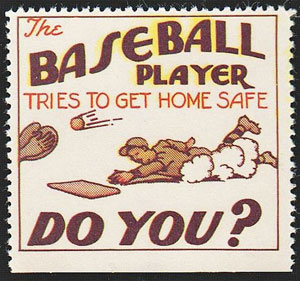
This is America
The “This is America” series, distributed during the 1930s and 1940s, featured 99 poster stamps (arranged 11 wide by 9 tall). Each stamp bore phrases such as “Justice, Freedom, Democracy” and “And I am proud. I am an American.” These collectible stamps celebrated American history and heritage, showcasing illustrations of historical figures, institutions, holidays, landmarks, and even baseball.
The key alongside the sheet reads: “The National Pastime. 1839 is the recognized year of the founding of the game. Abner Doubleday, a student at a Military School in Cooperstown, N.Y., conceived the game and laid out the first field of play. The first professional team was the Cincinnati Reds in 1869.”
The stamps were printed in blue on a white background, with a variation printed in purple on a blue background. The full sheet measures 12 inches wide by 19⅞ inches tall.
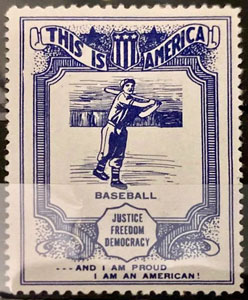
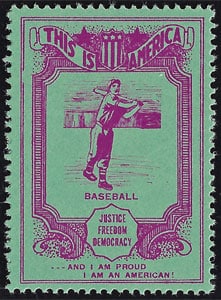
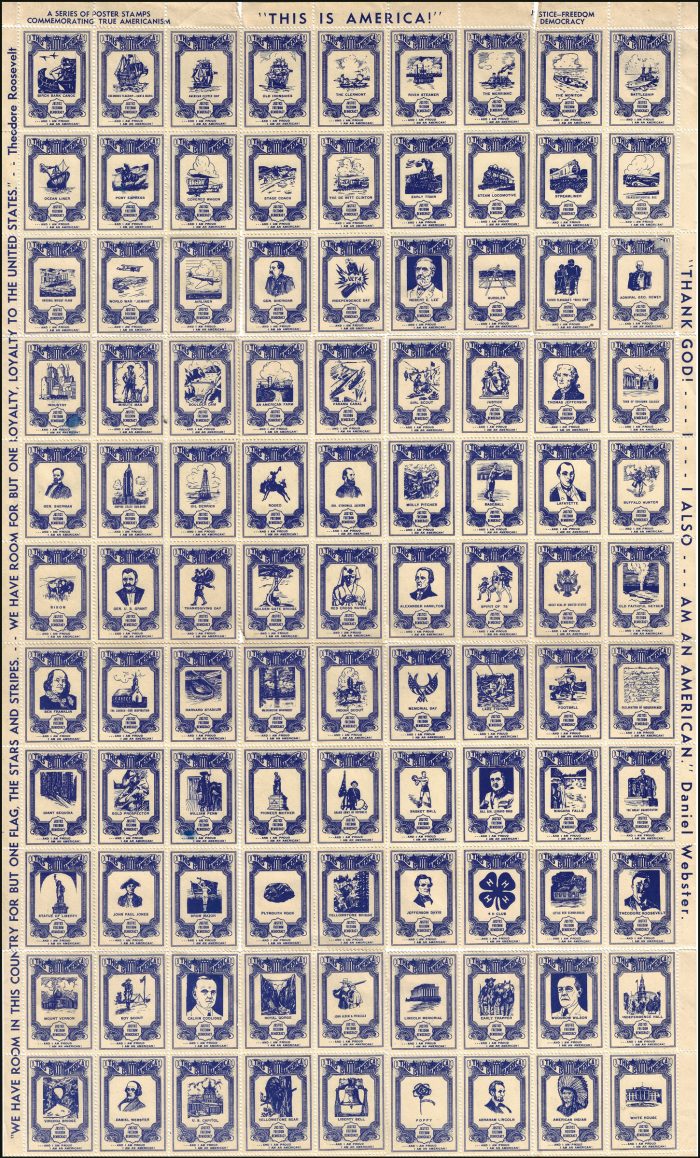
Thrifty Alexander
The “Thrifty Alexander” Poster Stamps, drawn by F.G. Cooper in 1914, consist of 52 miniature posters illustrating Thrifty Alexander’s journey to fortune. Issued only by banks, collectors could inquire at their bank for the series or obtain the first ten stamps for ten cents from the Harvey Blodgett Company. Additionally, 60 stamps from the American Advertiser, including ten Thrifty Alexander stamps, were available for 25 cents, with options to purchase views of St. Paul and a stamp album.
One notable stamp in this series is a baseball-themed stamp reflecting America’s growing enthusiasm for baseball It features a whimsical poem. In addition to banks such as the Oakland Bank of Savings, The Northwestern National Bank, Capital Trust Company in St. Paul, and Commercial National Bank in Great Falls, the Harvey Blodgett Company in St. Paul, Minnesota also offered these stamps for collectors. In 1922, Blodgett, who wrote the rhymes for the stamps, published the images and text as a 4″x6″ book.
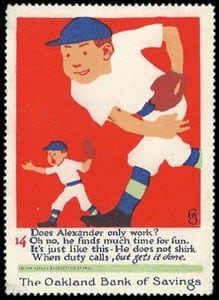
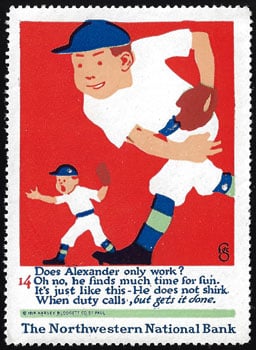
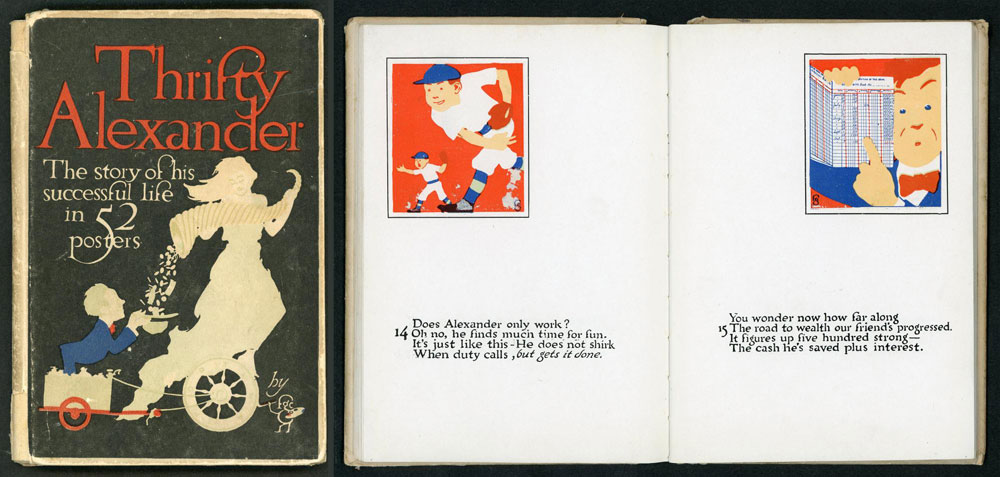
Time Inc.
These 1958 promotional stamps reflect Time Inc.’s strategy to boost subscriptions for Time magazine and Sports Illustrated, both of which it owned. The Time magazine stamp features Walter O’Malley, then-owner of the Brooklyn/Los Angeles Dodgers, promoting 27 issues for $1.97 with a savings of $1.66.
The Sports Illustrated stamp features Yankees player Gil McDougald, offering 23 issues for $1.97 with a savings of $1.34. By connecting sports figures with general-interest news and leveraging prominent athletes to highlight engaging sports coverage, Time Inc. used popular figures to increase readership across both publications.
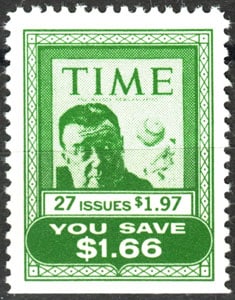
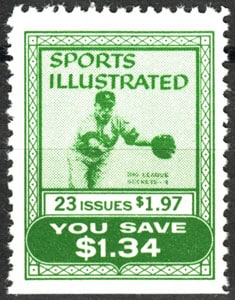
Toledo Mud Hens
The Toledo Mud Hens were the Triple A affiliate of the Detroit Tigers in 1996 while celebrating their centennial season. They created a local post stamp issue to celebrate the occasion. Tony Clark, the Executive Director of the Major League Baseball Players Association played for Toledo that season, batting .299 with 14 home runs before being called up to the Tigers to finish his rookie season.
This local post stamp sheet was released at the Toledo Stamp Expo in 1996 by the Stamp Collector’s Club of Toledo to by tribute to the home town club.
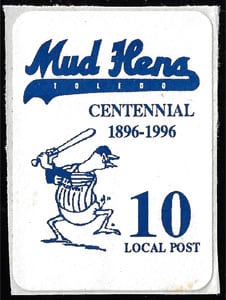
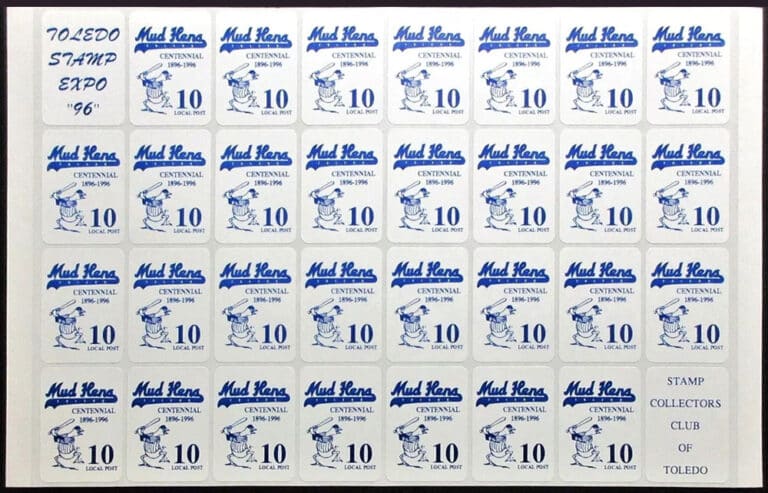
Toronto Blue Jays Victory Seals
Issued by Canada Post in 1993, these commemorative stamps celebrate the first World Series championship by the Toronto Blue Jays in 1993. A cover souvenir sheet features Paul Molitor, Joe Carter, Cito Gaston, and the Blue Jays logo. Plus, there are 3 individual victory seal stamps of the same players. The set sold for $4 at the time.
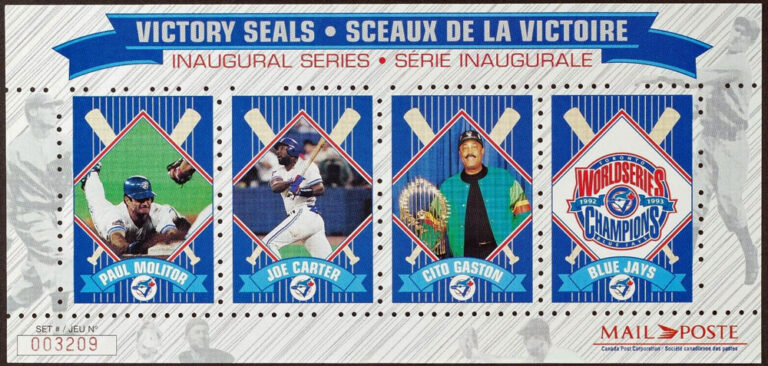
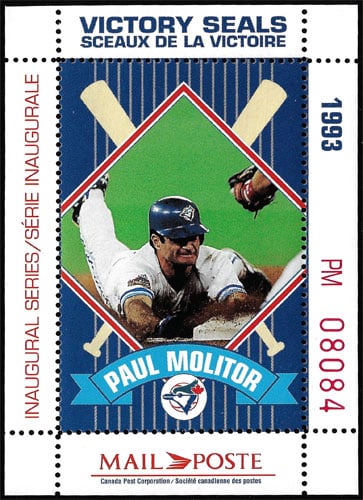
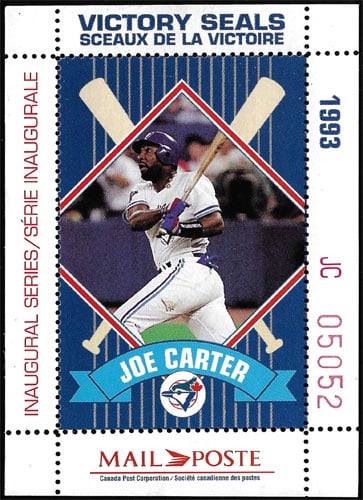
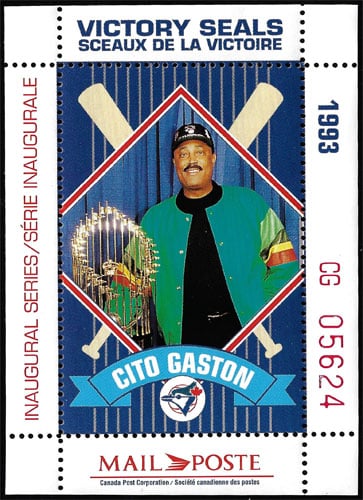
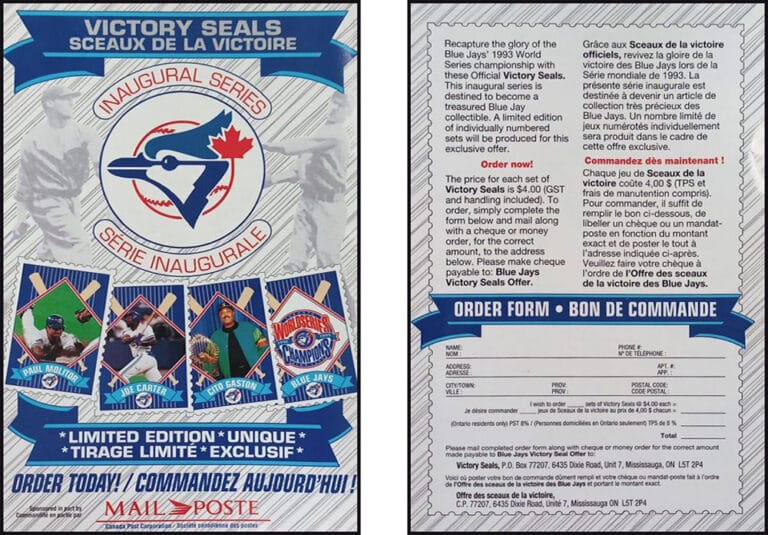
Wrigley’s Spearmint Gum
This satirical souvenir sheet was issued by the Wilkinson Stamp Club in 1970. This stamp sheet was intended to commemorate Apollo 8 (from 1968) with a baseball motif. WSC placed “Wrigley Field” on one of the stamps. As a parody to the Wrigley’s Gum logo, they designed “Peppermint” and “Spearmint” arrows in the stamp design. This infringed on the Wrigley Company trademark, and special permission was required for WSC to sell the stamps through the end of the year – at which time, all remainders had to be destroyed.
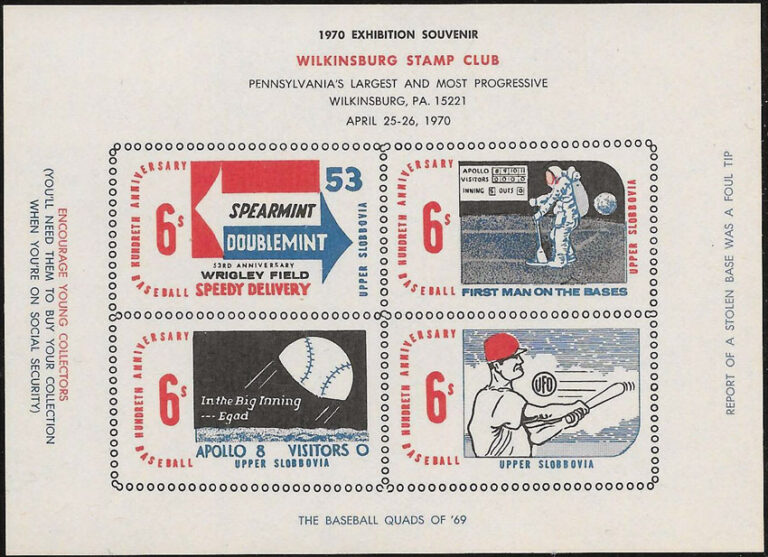
As early as the 1920’s, Wrigley Company began using baseball concepts in their advertising. So perhaps they enjoyed the free publicity stamps gave them. Even stamps have a gummy flavor!
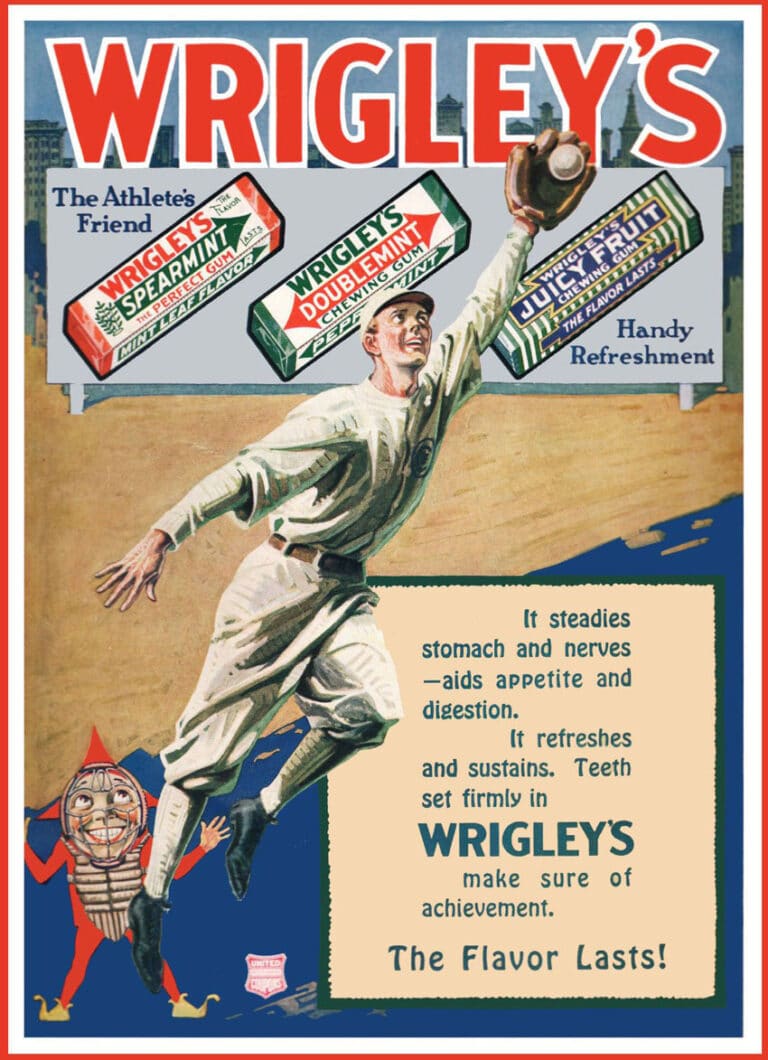
The Youth’s Companion
The Youth’s Companion was an children’s magazine that was printed from 1827 to 1929, until it became The American Boy in 1929. The Companion was published in Boston, Massachusetts by Perry Mason & Co. This stamp was printed between 1914 and 1917 to promote outdoor and indoor sports for boys, and is of New York Giants pitcher, Rube Marquard.
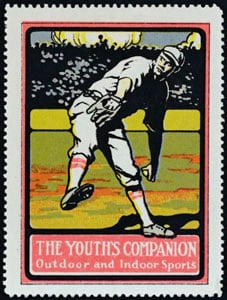
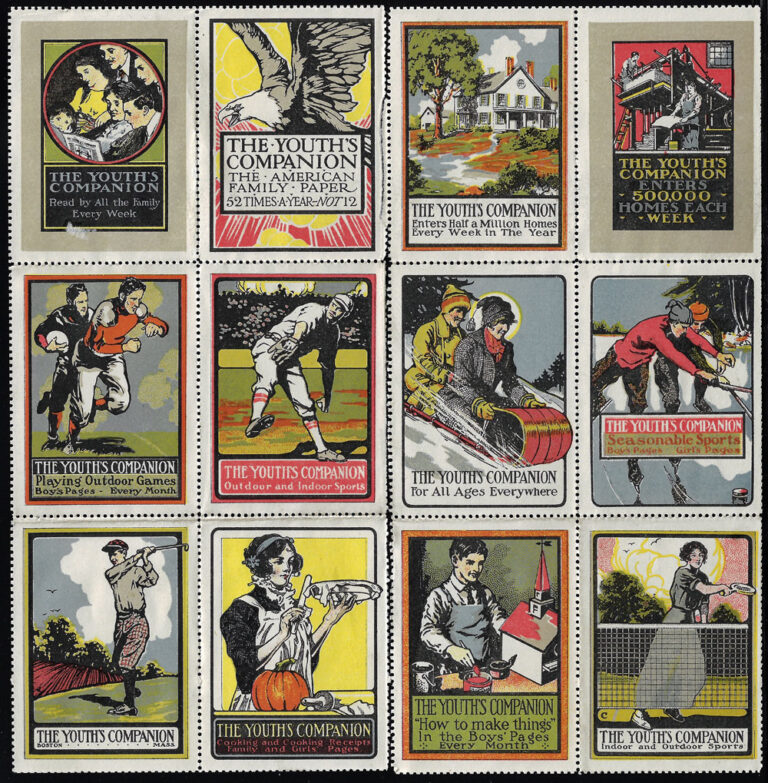
Unknown Cinderella Baseball Stamps
While collecting, I have stumbled across various Cinderella stamps with baseball themes. I have no idea what these are, so if you have any ideas, let me know!!
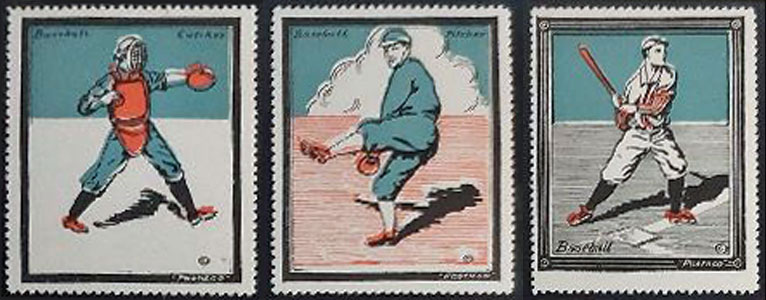
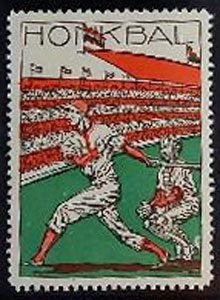
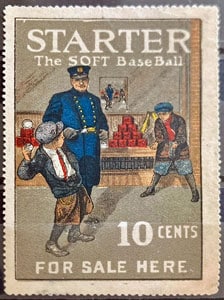
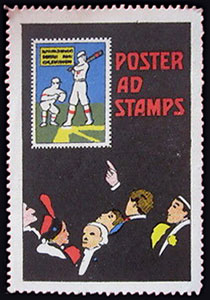
See all Baseball U.S. Postage Stamps:
Baseball Postage Stamps
- U.S. Baseball Stamp Issues:
- 1939 Centennial of Baseball
- 1969 100th Anniversary of Baseball
- 1969 Grandma Moses
- 1982 Jackie Robinson
- 1983 Babe Ruth
- 1984 Roberto Clemente
- 1989 Lou Gehrig
- 1989 Legends Stamp Album
- 1991 Abbott & Costello
- 1992 Olympic Summer Games
- 1995 Recreational Sports
- 1996 Centennial Olympic Games
- 1996 Folk Heroes
- 1998-2000 Celebrate the Century
- 2000 Legends of Baseball
- 2000 Youth Team Sports
- 2001 Legendary Playing Fields
- 2006 Baseball Sluggers
- 2008 Take Me Out To The Ballgame
- 2010 Negro League Baseball
- 2012 MLB All-Stars
- 2012 Play Ball! Stamp Book
- 2017 Have a Ball
- 2020 Bugs Bunny
- 2021 Yogi Berra
- 2021 Backyard Games
- 2024 Hank Aaron
- MLB Pro Stamps
- Topps Stamp Collection Cards
- Non-Postage Stamps
- International Baseball Stamps:
- Int'l Stamps (1930 to 1959)
- Int'l Stamps (1960 to 1969)
- Int'l Stamps (1970 to 1979)
- Int'l Stamps (1980 to 1984)
- Int'l Stamps (1985 to 1989)
- Int'l Stamps (1990 to 1994)
- Int'l Stamps (1995 to 1999)
- Int'l Stamps (2000)
- Int'l Stamps (2001)
- Int'l Stamps (2002)
- Int'l Stamps (2003)
- Int'l Stamps (2004)
- Int'l Stamps (2005)
- Int'l Stamps (2006)
- Int'l Stamps (2007)
- Int'l Stamps (2008)
- Int'l Stamps (2009)
- Int'l Stamps (2010)
- Int'l Stamps (2011)
- Int'l Stamps (2012)
- Int'l Stamps (2013)
- Int'l Stamps (2014)
- Int'l Stamps (2015)
- Int'l Stamps (2016)
- Int'l Stamps (2017)
- Int'l Stamps (2018)
- Int'l Stamps (2019)
- Int'l Stamps (2020)
- Int'l Stamps (2021)
- Int'l Stamps (2022)
- Int'l Stamps (2023)
- Int'l Stamps (2024)
- Int'l Stamps (2025)
Browse the Complete Baseball Stamp Checklist, view U.S. Postage Stamps, or view a year from the international stamp collection.
